- Numerical Reasoning
- Verbal Reasoning
- Inductive Reasoning
- Logical Reasoning
- Situational Judgement
- Mechanical Reasoning
- Watson Glaser Critical thinking
- Deductive reasoning
- Abstract reasoning
- Spatial reasoning
- Error checking
- Verbal comprehension
- Reading comprehension
- Diagrammatic Reasoning
- Psychometric tests
- Personality test
- In-Tray exercise
- E-Tray exercise
- Competency based assessment
- Game based assessments
- Analysis exercise
- Group exercise
- Presentation exercise
- Video interview
- Strengths based assessment
- Strengths based interviews
- Saville Assessment
- Talent Q / Korn Ferry
- Watson Glaser
- Criterion Partnership
- Test Partnership
- Cut-e / Aon
- Team Focus PFS
- Sova Assessment

Chapter 6: Case Study Exercises

A resource guide to help you master case study exercises
Page contents:
What is a case study exercise, how to answer a case study exercise, what skills does a case-study exercise assess, what questions will be asked in a case study exercise, case study exercise tips to succeed, key takeaways.
Case-study exercises are a very popular part of an assessment centre. But don't worry, with a bit of preparation and understanding, you can ace this part of the assessment.
Case study exercises are a popular tool used by employers to evaluate candidates' problem-solving skills, analytical thinking, and decision-making abilities. These exercises can be in the form of a written report, a presentation, or a group discussion, and typically involve a hypothetical business problem that requires a solution.
The case study presents the candidate with a series of fictional documents such as company reports, a consultant’s report, results from new product research etc. (i.e. similar to the in-tray exercise except these documents will be longer). You will then be asked to make business decisions based on the information. This can be done as an individual exercise, or more likely done in a group discussion so that assessors can also score your teamworking ability.
Before you start the exercise, it's important to carefully read and understand the instructions. Make sure you know what you're being asked to do, what resources you have available to you, and how your performance will be assessed. If you're unsure about anything, don't be afraid to ask for clarification.
Once you've read the case study, it's time to start analysing the problem. This involves breaking down the problem into its component parts, identifying the key issues, and considering different options for addressing them. It's important to approach the problem from different angles and to consider the implications of each possible solution.
During the exercise, you'll need to demonstrate your ability to work well under pressure, to think on your feet, and to communicate your ideas effectively. Make sure to use clear and concise language, and to back up your arguments with evidence and examples.
If you're working on a group case study exercise, it's important to listen to the ideas of others and to contribute your own ideas in a constructive and respectful way. Remember that the assessors are not only evaluating your individual performance but also how well you work as part of a team.
When it comes to presenting your solution, make sure to structure your presentation in a clear and logical way. Start with an introduction that sets out the problem and your approach, then move onto your analysis and recommendations, and finish with a conclusion that summarizes your key points. Make sure to keep to time and to engage your audience with your presentation.
A case study exercise is designed to assess several core competencies that are critical for success in the role you are applying for. There will be many common competencies that will be valuable across most roles in the professional world, these competencies typically include:
- Problem-Solving Skills: The ability to identify and analyse problems, and to develop and implement effective solutions.
- Analytical Thinking: The capacity to break down complex information into smaller parts, evaluate it systematically, and draw meaningful conclusions.
- Decision-Making Abilities: The ability to make well-informed and timely decisions, considering all relevant information and potential outcomes.
- Communication Skills: The capacity to convey ideas clearly and concisely, and to listen actively to others.
- Teamwork Skills: The ability to collaborate effectively with others, and to work towards a shared goal.
- Time Management: The capacity to prioritise tasks and to manage time effectively, while maintaining quality and meeting deadlines.
By assessing these competencies, employers can gain valuable insights into how candidates approach problems, how they think critically, and how they work with others to achieve goals. Ultimately, the aim is to identify candidates who can add value to the organisation, and who have the potential to become successful and productive members of the team.
Different companies will prioritise certain competencies; the original job description is a great place to look for finding out what competencies the employer desires and so will likely be scoring you against during the assessment centre activities.
The type of questions that may be asked can vary, but here are some examples of the most common types:
- Analytical Questions: These questions require the candidate to analyse a set of data or information and draw conclusions based on their findings. For example: "You have been given a dataset on customer behaviour. What insights can you draw from the data to improve sales performance?"
- Decision-Making Questions: These questions ask the candidate to make a decision based on a given scenario. For example: "You are the CEO of a company that is considering a merger. What factors would you consider when making the decision to proceed with the merger?"
- Group Discussion Questions: In a group case study exercise, candidates may be asked to work together to analyse a problem and present their findings to the assessors. For example: "As a team, analyse the strengths and weaknesses of our company's current marketing strategy and recommend improvements."
The questions are designed to test the candidate's problem-solving, analytical thinking, decision-making, and communication skills. It's important to carefully read and understand the questions, and to provide well-reasoned and evidence-based responses.
It has been known for employers to use real live projects for the case study exercise with sensitive information swapped for fictional examples.
Information from the case study exercise lends itself to be used as scene-setting for other exercises at the assessment centre. It is common to have the same fictional setting running through the assessment centre, to save time on having to describe a new scenario for each task. You will be told in each exercise if you are expected to remember the information from a previous exercise, but this is rarely the case. Usually the only information common to multiple exercises is the fictional scenario; all data to be used in each exercise will be part of that exercise.
Don't leave your future career down to chance!
Get a completely free starter account
- Over 20 tests
- Track your progress
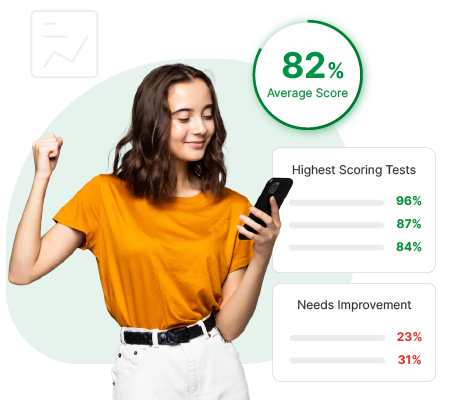
Here are some key tips to help you prepare for and successfully pass a case study exercise at an assessment centre:
- Understand the Brief: Carefully read and analyse the case study brief, making sure you understand the problem or scenario being presented, and the information and data provided. Take notes and identify key issues and opportunities.
- Plan Your Approach: Take some time to plan your approach to the case study exercise. Consider the key challenges and opportunities, and identify potential solutions and recommendations. This will help you structure your thoughts and prioritise your ideas.
- Use Evidence: Use evidence from the case study, as well as your own research and knowledge, to support your ideas and recommendations. This will demonstrate your analytical thinking and problem-solving skills.
- Stay Focused: During the exercise, stay focused on the task at hand and avoid getting sidetracked by irrelevant information or details. Keep the objective of the exercise in mind, and stay on track with your analysis and recommendations.
- Collaborate Effectively: If the case study exercise involves group work, make sure to communicate clearly and effectively with your team members. Listen actively to their ideas, and contribute constructively to the discussion.
- Be Confident: Have confidence in your ideas and recommendations, and be prepared to defend your positions if challenged. Speak clearly and confidently, and use evidence and data to support your arguments.
Here is the summary of what case-study exercises are and how to pass them:
- A case study exercise is a type of assessment where candidates are presented with a hypothetical business scenario and asked to provide solutions or recommendations.
- These exercises assess a range of competencies such as problem-solving, analytical thinking, decision-making, communication, teamwork, and time management.
- To pass a case study exercise, it's important to carefully read and understand the brief, plan your approach, use evidence to support your ideas, stay focused, collaborate effectively, be confident, and manage your time effectively.
Fully understanding the format of the exercise, taking practice case-study exercises and following our tips outlined above will drastically improve the chances of you standing out as a star candidate at the assessment centre.
- Aptitude Tests Preparation
- Assessment Centre Exercises
- Case Study Assessment
Case Study Assessment - Learn How to Pass
A case study assessment is a popular tool used in assessment centres for evaluating candidates by presenting them with complex and previously unknown scenarios . After analyzing the information and identifying the most relevant parts, candidates answer questions that provide the employer with insights regarding important aspects of the candidate's knowledge, cognitive abilities, and personal attributes.
Like other tests, preparing for the case study assessment can make a huge difference to your score. On this page we will review useful information that can help you arrive at your case study assessment better prepared and maximize your chances to pass and land the job you're after.
JobTestPrep is a leading test prep company that offers accurate practice simulations for hundreds of pre-employment tests. Since 1992, it has helped 1M+ candidates. If you have any additional questions about the Assessment Centre Test, feel free to send us an email , we usually reply within 24 hours.
What is a Case Study Assessment
A case study assessment is a test in which candidates are presented with a scenario related to the position or the company's wider operations, followed by several questions that are designed to measure specific abilities. Through the candidate's answers, employers gain insight into their ability to handle tasks similar to those they might be responsible for in the future, thus indicating their problem solving abilities and compatibility with the job description.
Typically, a case study assessment introduces a series documents such as reports and data from recent market research, which may relate to hypothetical or real-life situations. You are asked to analyze the case at hand, make business decisions, and/or give a brief verbal or written report of your recommendations. You may be asked to complete the case study as an individual exercise or as part of a group, which allows assessors to evaluate your teamwork.
The Two Main Types of Case Study Assessment
An assessment center case study will typically belong to one of two main categories:
Subject-related Case Study Assessment
In this type of case study assessment, specific and professional knowledge of the subject is required. In cases of candidates applying for a position in which industry knowledge is essential, the content of the case study will be directly relevant to that role . In these cases, candidates are required to use their existing knowledge and experience to identify key information from the brief.
For instance, project managers may be asked to plan for the release of a new product, which incorporates scheduling, budgeting and resourcing.
General Case Study Assessment
These case studies are designed for a broad audience of candidates who are tested for various positions. Answering the case study questions does not require any specific prior knowledge , and most questions can be answered with common sense. Any information that is required for answering the case study questions is provided by the assessor, whether orally or through additional documentation.
These case studies are much more popular as they can be completed by a large number of candidates applying for a wide array of positions.
What the Case Study Assessment Measures
The advantage of the assessment center case study is that it measures a number of elements simultaneously, giving the employer a picture which combines soft skills with cognitive abilities and even personality attributes. Through your answers, the employer can learn about your:
- Judgement and understanding of the situation at hand
- Thoroughness of analysis
- Logical presentation of ideas
- Practicality of the proposed solutions
- Creativity and innovation in problem solving
- Presentation abilities & communication skills
- Ability to answer off the cuff comments
- Commercial awareness
- Organizational skills
- Decisiveness
Which Types of Companies Use Assessment Centre Case Studies
- The first type of assessment centre case study exercise is those for various positions in finance, banking , audit, marketing, IT, and others. These case studies are based on a large file of documents such as company reports you must quickly read and analyze. They may be completed as part of an assessment day or given at the employer's office as part of the interview.
- Another type of case study assessment you can find in assessment centres is for consultancy and business management companies. The scenario is usually described by the interviewer or is limited to a few pages. Generally, the task revolves around mathematical problems, estimation questions and strategic thinking. The candidate is expected to ask the assessor for more details in order to understand the problems at hand. Learn more about these tests here .
Leading companies that Use Assessment Centre Case Studies:
- EY (Ernst & Young)
Popular Assessment Center Case Study Topics
Case studies can be about virtually anything - however there are some topics or that appear more frequently than others. Below is a list of ideas you may encounter in your case study assessment:
- Strategic decisions in global or local business contexts.
- Expansion of departments, acquisition of new companies or products.
- Entrance into new fields of development and product lines.
- Exploring new markets.
- Reconstructing organizational trees.
- Creating advertising campaigns.
- Competition analysis
Tips for Approaching Your Case Study Assessment
- Immerse yourself in the case study - try to imagine you really are in the scenario, and put yourself in the shoes of the decision maker and those he needs to report to.
- Time management - as you will have a lot of data and documents to make sense of in a short period of time, your time management skills are being put to the test here. The key to success is learning how to identify key points and prioritize relevant information while ignoring the irrelevant, giving you the ability to work efficiently on the actual assessment day.
- There is more than one ‘correct’ answer - a case study assessment usually has more than one right answer, and as long as you can logically justify your recommendations and they stand up to questioning by the assessor, your analysis can be regarded in a positive light.
- Don't get lost in the nuances of a particular industry you are presented with in the case studies. Focus instead on tackling common challenges faced by most businesses.
- Client focus - all companies want to keep their clientele happy. If there is a client in the case study, put plenty of emphasis on them and their needs.
- Be confident but not arrogant. When presenting, try to convey an air of knowledge and authority - without appearing overconfident or arrogant.
- Practice your presentation skills with friends or family to reduce the pressure at the actual assessment centre.
Common Questions in the Assessment Center Case Study
There are two main types of questions that can be asked by the assessors in an assessment center case study.
Quantitative questions involve basic mathematical operations, using of the four basic operations, percentages and ratios. Qualitative questions will relate to strategic decisions, future projections, and market analysis. Popular questions would be:
- What penetration strategy do you find suitable for the market in question?
- What are the changes that company Y must go through if it seeks the preservation of existing markets?
- What are the approximate annual developmental costs of company X?

Why Do Employers Use Case Studies at Assessment Centers?
What to expect from a case study exercise, how to prepare for the case study exercise in 2024, how to approach a group exercise, how to approach a presentation, case study exercises at assessment centers (2024 guide).
Updated November 21, 2023

Should you be invited to be tested at an assessment center as part of an employer's recruitment process, one of the exercises you may face is a case study .
A case study exercise presents you with a scenario similar to what you would experience in the job you have applied for.
It will generally be accompanied by documents, emails or other forms of information.
You are asked to make business decisions based on the data you have been provided with, either alone or as part of a group of candidates.
A case study enables employers to assess your skill-base and likely performance in the job, providing them with a more rounded view of the type of employee you would be and the value you would bring to the company.
Commonly used in the finance, banking, legal and business management industries, the main advantage to employers of using case study exercises is to see candidates in action, demonstrating the skills they would be expected to use at work.
The skills assessed when participating in a case study exercise will vary depending on the employer, the industry and the job applied for, but may include:
- Analytical skills
- Strategic thinking
- Decision making
- Problem-solving
- Communication
- Stress tolerance
- The ability to assimilate information quickly and effectively
- Organisational skills
- Situational judgment
- Commercial awareness
- Time management
- Team working
- Knowledge pertinent to the industry or job, for example, marketing skills
Despite the skills that the employer is actively assessing, such as those mentioned above, success in a case study exercise relies on your ability to:
- Interpret and analyze the information provided
- Reach a decision
- Use commercial awareness
- Manage your time
- Communicate well
Practice Case Study Exercises with JobTestPrep
There are generally two types of case study exercise that you may face as part of a selection process:
- Subject-related case studies pertinent to the job you are applying for and the related industry
- General case studies that assess your overall aptitude and skills
The actual scenario of the case study exercise you face will vary, but examples of typical case studies include:
- Expanding a team or department
- Deciding whether an acquisition or merger is advisable
- Investigating whether to begin a new product line
- Re-organisation of management structure
- The creation of an advertising campaign
- Responding to negative publicity
- Choosing from three business proposals
- Developing a social media presence
Prepare for Case Study Exercises with JobTestPrep
For example: You are presented with the scenario of an IT company that went through an expensive re-brand one year ago. At that time, the company moved to bigger premises in a better area, and two new teams of developers were recruited to work with two new clients. The IT company has recently lost one of those clients and is facing increasing costs as the rent is raised for their premises. The company's directors have concluded that they must make one of the following changes: Make staff redundancies and offer the chance to several employees to change to part-time hours Move to less expensive premises in a less desirable area Combine a move to a flexible working business model where employees work part of the week from home and desk-share in the office along with a physical move to smaller premises in the same area where the IT company is currently based
You are asked to advise the directors on which change would provide the greatest benefit.
Here is another example:
A multi-national environmental testing organization buys out an oil-testing laboratory. A gap test is carried out on whether: The oil-testing lab should be brought in line with the rest of the organization concerning its processes, customer interface, and testing procedures The oil-testing lab should be closed down and its clients absorbed into the rest of the organization The oil-testing lab should be allowed to continue as it is, but new processes put in place between it and the larger organization
You are asked to consider the findings of the gap test and suggest the best course of action.
Just as you would prepare before a job interview, it is always in your best interests to prepare before facing a case study exercise at an assessment center.
Step 1 . Do the Research
There is a whole range of research you can look into to prepare yourself for the case study exercise:
- The job description and any other literature or documents forwarded to you
- The employer's website and social media
- Industry related news stories and developments
Any of the above should provide you with a better understanding of the job you have applied for, the industry you will work within, and the culture and values of the employer.
Step 2 . Use Practice Case Studies
Practicing case study exercises in the run-up to the assessment day is one of the best ways you can prepare for the real thing.
Unless the employer provides sample case studies on their website or as part of their recruitment pack, you will not know the exact format that the exercise will take; however, you can build familiarity with the overall process of a case study through practice.
You can find plenty of practice case study exercises online. Most of these come at a cost, but you may also be able to find free sample case studies too.
For case study resources at a cost, have a look at JobTestPrep .
For two free sample case study exercises, you might like to visit Bain & Company's website .
Scroll down to the Associate Consultant Case Library. Europa also offers an extensive and detailed sample case study .
Step 3 . Timed Practice
Once you have sourced one or more practice case studies, take the opportunity to practice to a time limit.
The case study may come with a time limit, or the employer may have already told you how long you will have to complete the real case study exercise on the day.
Alternatively, set your reasonable time limit.
Timed practice will improve your response time and explain exactly how much time you should allocate to each stage of the case study process.
Step 4 . Improve Your Reading Comprehension
One skill that is key to handle a case study exercise successfully is your reading comprehension, that is, your ability to understand written information, interpret it and describe it in your own words.
In the context of a case study, this skill will help you to assimilate the information provided to you quickly, analyze it and ultimately reach a decision.
In the run-up to your assessment day, put aside time to improve your reading comprehension by reading a wide variety of material and picking out the key points of each passage.
You might find it especially helpful to read professional journals and news articles related to the job you have applied for and the related industry.
Try to improve the speed at which you can read but still retain information too. This will prove helpful during the real case study exercise.
Step 5 . Practice Mental Math
The case study exercise may include prices, area measurements, staff numbers, salaries and other numeric values.
It is important that you can complete basic mental math calculations, such as multiplication and percentages.
Practice your mental math using puzzle books, online math resources and math problems that you create yourself.
You can find plenty of online business math resources, for example:
- The University of Alabama at Birmingham Math and Business Guide
- Money Instructor
- Open Textbook Library
If you need to prepare for a number of different employment tests and want to outsmart the competition, choose a Premium Membership from JobTestPrep . You will get access to three PrepPacks of your choice, from a database that covers all the major test providers and employers and tailored profession packs.
Get a Premium Package Now

Top Tips for Approaching Case Study Exercises
Now that you have prepared yourself, you can further improve your chances of a successful outcome by following our top tips on approaching case study exercises on the day.
Read the Information Carefully
Read all of the information provided as part of your case study exercise to understand what is being asked of you fully.
Quickly identify the key points in the task and the overall decision you have been asked to make, for example:
- Has the exercise provided you with a choice of outcomes you must decide between, or must you create the outcome yourself?
- What information do you need to make your decision?
- Are there calculations involved in the task?
- What character are you playing in the task (for example, HR manager or business consultant) and what are that character's motivations?
- Who is your character presenting their response to? Company directors, client or HR department?
Prioritize the Information
Prioritize the information by importance.
Which pieces of information are most pertinent to the task, and what key data do they provide?
Can any of the information be dismissed? Does any of the information contradict or sit in conflict with others?
Divide Up the Tasks and Allocate Time
You will generally be asked to come to a conclusion or advise a course of action regarding your case study exercise; however, you may have to carry out several tasks to arrive at this result.
Once you have read through the information, plan out what tasks the exercise will entail and allocate time for each one.
Do Not Be Distracted by Finding the Only 'Right' Answer
Where you are provided with several outcomes, and you must decide on one, do not assume that anyone's outcome is the only right answer to give.
It may be that any of the outcomes could be correct if you can sufficiently support your decision from the information provided.
Keep the Objective in Focus
- What does the task ask you to do?
- Must you choose between three business acquisitions?
- Are you providing advice on whether or not to invest?
- Are you putting together a plan for a staff redundancy situation?
Keep the objective of the case study exercise in mind at all times.
Support Your Decision With Evidence
The conclusion you come to may seem obvious to you, but you must be able to support your decision with evidence.
Why would it be better for the company to invest in property overstock? What is the benefit to the company of entering a new market?
It is not sufficient to know which outcome would be the best. As in the real-life business world, you must be able to support your claims.
If you are assessed as part of a group, you must arrive at a conclusion as a team and bear in mind your strengths.
For example, do you have a good eye for detail and would therefore be suited to the analytical part of the task?
Arrive at a list of tasks together and then assign the tasks to different members of the group.
Please make sure you contribute to the group discussions but do not dominate them.
Group assessments are generally used by employers who place value on leadership, teamwork and communication skills.
If you are asked to present your findings or conclusion as part of a case study exercise, bear in mind to whom the task has asked you to make that presentation.
For example, a business client or a marketing manager.
Make sure that you can fully support the reasons that you came to your conclusion.
If you are presenting as a group, make sure that each group member has their role to play in the presentation and that everyone knows why the group came to that conclusion.
Act professionally to suit the job you have applied for. Be polite, confident and well-spoken.
Case study exercises are just one of the many methods that employers use to assess job applicants, and as with any other aspect of the selection process, they require a degree of consideration and preparation.
The best way to improve your chances of a successful outcome and reduce exam tension is to research the job and the industry, practice case study exercises and improve your skills.
You might also be interested in these other Psychometric Success articles:

Or explore the Aptitude Tests / Test Types sections.
Get 25% off all test packages.
Get 25% off all test packages!
Click below to get 25% off all test packages.
Case Study Exercise At Assessment Centres
A case study exercise is a practical assessment commonly used in the latter stages of recruitment for graduate jobs. One of several activities undertaken at an assessment centre , this particular type of exercise allows employers to see your skills in action in a work-based context.
What is a case study exercise?
A case study exercise consists of a hypothetical scenario, similar to something you’d expect to encounter in daily working life. You’ll be tasked with examining information, drawing conclusions, and proposing business-based solutions for the situation at hand.
Information is typically presented in the form of fictional documentation: for example, market research findings, company reports, or details on a potential new venture. In some cases, it will be verbally communicated by the assessor.
You may also have additional or updated information drip-fed to you throughout the exercise.
You could be asked to work as an individual, but it’s more common to tackle a case study exercise as part of a group, since this shows a wider array of skills like teamwork and joint decision-making.
In both cases you’ll have a set amount of time to analyse the scenario and supporting information before presenting your findings, either through a written report or a presentation to an assessment panel. Here, you’ll need to explain your process and justify all decisions made.
Historically, assessment centres have been attended in person, but as more companies look to adopt virtual techniques, you may take part in a remote case study exercise. Depending on the employer and their platform of choice, this could be via pre-recorded content or a video conferencing tool that allows you to work alongside other candidates.

What competencies does a case study exercise assess?
There are multiple skills under assessment throughout a case study exercise. The most common are:
Problem solving
In itself, this involves various skills, like analytical thinking , creativity and innovation. How you approach your case study exercise will show employers how you’re likely to implement problem-solving skills in the work environment.
Show these at every stage of the process. If working in a group, be sure to make a contribution and be active in discussions, since assessors will be watching how you interact.
If working solo, explain your process to show problem solving in action.
Communication
How you present findings and communicate ideas is a major part of a case study exercise, as are other communication skills like effective listening.
Regardless of whether you present as an individual or a group, make sure you explain how you came to your conclusions, the evidence they’re based on and why you see them as effective.
Commercial awareness and business acumen
Assessors will be looking for a broader understanding of the industry in which the company operates and knowledge of best practice for growth.
Standout candidates will approach their case study with a business-first perspective, able to demonstrate how every decision made is rooted in organisational goals.
Decision making
At the heart of every case study exercise, there are key decisions to be made. Typically, there’s no right or wrong answer here, provided you can justify your decisions and back them up evidentially.
Along with problem solving, this is one of the top skills assessors are looking for, so don’t be hesitant. Make your decisions and stick to them.
Group exercises show assessors how well you work as part of a team, so make sure you’re actively involved, attentive and fair. Never dominate a discussion or press for your own agenda.
Approach all ideas equally and assess their pros and cons to arrive at the best solution.
What are the different types of case study exercise?
Depending on the role for which you’ve applied, you’ll either be presented with a general case study exercise or one related to a specific subject.
Subject-related case studies are used for roles where industry-specific knowledge is a prerequisite, and will be very much akin to the type of responsibilities you’ll be given if hired by the organisation.
For example, if applying for a role in mergers and acquisitions, you may be asked to assess the feasibility of a buy-out based on financial performance and market conditions.
General case studies are used to assess a wider pool of applicants for different positions. They do not require specific expertise, but rather rely on common sense and key competencies. All the information needed to complete the exercise will be made available to you.
Common topics covered in case study exercises include:
- The creation of new marketing campaigns
- Expansion through company or product acquisition
- Organisational change in terms of business structure
- Product or service diversification and entering new markets
- Strategic decision-making based on hypothetical influencing factors
Tips for performing well in case study exercises
1. process all the information.
Take time to fully understand the scenario and the objectives of the exercise, identify relevant information and highlight key points for analysis, or discussion if working as part of a team. This will help structure your approach in a logical manner.
2. Work collaboratively
In a group exercise , teamwork is vital. Assign roles based on individual skill sets. For example, if you’re a confident leader you may head up the exercise.
If you’re more of a listener, you may volunteer to keep notes. Avoid conflict by ensuring all points of view are heard and decisions made together.
3. Manage your time
Organisational skills and your ability to prioritise are both being evaluated, and since you have a set duration in which to complete the exercise, good time management is key.
Remember you also need to prepare a strong presentation, so allow plenty of scope for this.
Make an assertive decision
There’s no right answer to a case study exercise, but any conclusions you do draw should be evidenced-based and justifiable. Put forward solutions that you firmly believe in and can back up with solid reasoning.
5. Present your findings clearly
A case study exercise isn’t just about the decisions you make, but also how you articulate them. State your recommendations and then provide the background to your findings with clear, concise language and a confident presentation style.
If presenting as a group, assign specific sections to each person to avoid confusion.
How to prepare for a case study exercise
It’s unlikely you’ll know the nature of your case study exercise before your assessment day, but there are ways to prepare in advance. For a guide on the type of scenario you may face, review the job description or recruitment pack and look for key responsibilities.
You should also research the hiring organisation in full. Look into its company culture, read any recent press releases and refer to its social media to get a feel for both its day-to-day activities and wider achievements. Reading business news will also give you a good understanding of current issues relevant to the industry.
To improve your skills, carry out some practice case study exercises and present your findings to family or friends. This will get you used to the process and give you greater confidence on assessment centre day.
Choose a plan and start practising
Immediate access. Cancel anytime.
- 30 Numerical reasoning tests
- 30 Verbal reasoning tests
- 30 Diagrammatic reasoning tests
- 30 Situational judgement tests
- 34 Publisher packages e.g. Watson Glaser
- 252 Employer packages e.g. HSBC
- 29 Extra packages e.g Mechanical
- Dashboard performance tracking
- Full solutions and explanations
- Tips, tricks, guides and resources
- Access to free tests
- Basic performance tracking
- Solutions & explanations
- Tips and resources
By using our website you agree with our Cookie Policy.
- Saville Assessment
- Thomas International
- PI Cognitive Assessment (PLI)
- AON Hewitt G.A.T.E.
- Korn Ferry Leadership Assessment
- Profiling for Success (PFS)
- Predictive Index (PI)
- NEO Personality Inventory
- Leadership Assessment
- Gallup’s CliftonStrengths
- Sales Personality Tests
- Personality Management Tests
- Saville Wave
- McQuaig Word Survey
- Bell Leadership Assessment
- Myers Briggs Personality Test
- DISC Personality Test
- Management SJT
- Supervisory SJT
- Fire Service SJT
- Call Center SJT
- Administrative SJT
- Customer Service SJT
- Numerical Reasoning Tests
- Logical Reasoning Tests
- Verbal Reasoning Tests
- Cognitive Ability Tests
- Technical Aptitude Tests
- Spatial Reasoning Tests
- Abstract Reasoning Test
- Deductive Reasoning Tests
- Inductive Reasoning Tests
- Mechanical Reasoning Tests
- Diagrammatic Reasoning Tests
- Concentration Tests
- Fault Finding Aptitude Tests
- Senior Management Tests
- Matrigma Test
- Critical Thinking Test
- Criteria’s CCAT Test
- Initial Sift Test
- British Council
- Probation Officer Exam
- Ireland’s Civil Service Tests
- EU’s EPSO Tests
- NHS Assessment
- GLP Assessment
- Public Health Speciality Training
- Prison Officer Selection Test
- Firefighters Tests
- Police Tests
- Cancer Research UK
- British Army Officer Selection Board
- Hiring Processes by Professions
Select Page
Assessment Centre Case Studies Practice & Tips – 2024

Case studies are a central part of the exercises making up most assessment centres . Employers use them to provide valuable insight into the applicants. They provide a way to assess a graduate or job-seeker’s capability and their potential performance after selection. To do this, the assessment centre presents the candidate with a simulated situation that might be faced on the actual job and waits to see how the candidate will respond. The information assessors collect proves invaluable to companies as they work through the screening and hiring process with the candidates who are most likely to perform well in the job opening.
What Is a Case Study Exercise?
Case studies are simulation exercises that put a candidate into situations they might actually see while on the job. The exercises can be done as a group or individually. Which it is will depend on the employer and the assessment centre. The case studies typically provide information that includes financial reports, market studies, or competition analysis and other information that may relate to any aspect of the profession. It may also provide other company reports, consultant’s reports, new product research results, and more. This makes the exercise similar in some ways to an in-tray exercise though the documents are longer for a case study.
Key Features of Case Studies
The exercise can be presented at the end either in written report format or as a presentation, depending on the preference of those running the exam. The assessors then evaluate the candidate’s ability to analyze information with a logical approach to decision making and their aptitude for tackling difficult situations. From there, they score performance.
Case study exercises often are based on a few core topics. Some of these include:
- Finding the feasibility and profitability for the introduction of a new product or service
- Merger, acquisition, or joint venture related managerial decisions
- Annual report evaluation and profitability and loss analysis
- Task prioritization and problem-solving with a given deadline
Many times, the case study’s theme or scenario provides the stage for other assessment centre exercises, so paying attention to what the scenario is and the information provided about it can prove helpful in further exercises. If this is the case, the problem-solving case study is likely to show up as one of the first few exercises you do after re-taking the necessary psychometric aptitude assessments for score confirmation.
Competencies Required for Case Studies
The key competencies that case study exercises usually assess are:
- Analytical thinking and assimilation of information
- Commercial awareness and Innovation
- Organization
- Decisiveness and Judgment
The goal of the exercise is to review and analyze the given information to come up with solid business decisions. The assessors will look at both the decision reached and the logical justification for the recommendations. Because of this, the test is not designed to have one ‘correct’ answer. Instead, it is concerned with the approach to solving the issue as much as it is with the solution.
This is the point in the assessment and pre-hiring process where candidates should show the recruiters what they can do. Usually, the exercise lasts around forty minutes. Employers may use either fictional examples or, in some cases, even real live projects with the sensitive information replaced for fictional information.
Due to the nature of the exercise, job-seekers and graduates taking this type of assessment should possess several key skills. They must be able to interpret large quantities of data from multiple sources and in varying formats, use analytical and strategic analysis to solve problems, formulate and commit to a decision, demonstrate commercial and entrepreneurial insight on a problem, and use oral communication skills to discuss the decisions made and the reasoning behind them. Without these key abilities, case exercises may prove challenging for individuals.
How to Prepare for Case Study Exercises?
With the large amount of information presented on assessment centre case studies and the many things to consider, it can be difficult to know where to start. Particularly for those participating in a graduate assessment centre case studies with no prior experience with assessment centres, the case study may seem daunting.
However, it is possible to prepare with some case study practice and by reviewing assessment case study examples similar to the ones that will be given in your assessment centre. These tips for preparation and practice as well the day of will help those facing a case study assessment to do so with confidence.
Case Studies: Tips for Success
Review the advice below as you begin to prepare for the assessment centre:
- If it is a group exercise , show the recruiters you can work with the team.
- For a group exercise, determine what roles individuals in the scenario are associated with and how they may interact with your or impact the analysis and decision-making process.
- Determine what information needs to be kept and what should be discarded as early on as possible.
- Manage time carefully and plan your approach based on the time available to you.
- Consider all possible solutions and analyze them carefully before choosing a decision.
- When finished, ensure that you have a solid foundation for the proposal and a plan of action to implement for your chosen solution.
- Make sure you communicate that foundation and the logic behind your decision.
- When presenting as a group, actively participate but avoid dominating the conversation or situation.
- Gather information on the organization, job profile, and any other data that could be in the case study to be prepared before assessment day if possible.
- If you do not need to present for a group exercise, consider nominating yourself as someone who can respond to questions.
- Practice structuring and delivering presentations in a case study format before testing.
If you follow the advice above and put in enough time practising and preparing to feel confident, you should be able to ace this portion of your assessment centre. Remember that the solution is not the most important thing about this exercise. How you work with others and the reasoning behind your answer is. So, use the time you have wisely and do not overlook anything as you work to come to a good solution. As you do this, relax and use this as a chance to show the recruiters that you really know what you said you did during the interview stage . That is what this exam is about.
Assessment Centre
- Written Exercises
- Job Interviews
- Competency-Based Interview Q&A
- In-Tray Exercise
- Group Exercises
Related Links:
- Aptitude Tests
- Situational Judgement Tests (SJT)
- Job Personality Tests
- Civil Service Exams
- NHS Assessments
- Police Forces Tests
- Firefighter Tests
- British Army Tests
- Assessment Companies
- Assessment Centres Guide – 2024
- Hiring Companies – Find an Employer
Assessment centre activities and examples
Are you an assessor looking for assessment centre activities to run? If so, we can help .
Our experiential learning materials are used in assessment centres all over the world , by heavyweight names like KPMG, Gatwick Airport, and EasyJet.
As an assessor, this post will guide you through the whole process and prepare you to lead a selection of effective activities.
Or if you’ll be attending an assessment centre, this post will give you an idea of the logic underpinning the activities you’re about to encounter.
Here’s what we’ll cover. Click the links to skip ahead to any section:
Key assessment centre concepts
Benefits of an assessment centre, the role of the assessor, activities for recruitment assessment centres , group assessment centre activities with examples, role-play assessment centre activities with examples, virtual assessment centre activities with examples, in-tray assessment centre activities with examples.
We’ll start by introducing some key concepts in case you’re not familiar. To skip this and go straight to the activities, click here.
Assessment centre
A methodology used to identify the candidate(s) best suited to a role or position.
Despite the name, an assessment centre isn’t a specific physical place. It’s a set of exercises to assist with personnel selection, designed to simulate the job and give participants an opportunity to demonstrate the skills required to succeed.
A person tasked with carrying out assessment centre activities, often with formal training to ensure objectivity.
Candidate / participant
A person being assessed for their suitability for a role via completion of the assessment centre.
A type of assessment centre activity in which candidates are given question-based prompts to determine the suitability of their experience and attitude.
Group exercises
A type of assessment centre activity which multiple candidates work together to complete, possibly while playing assigned roles.
Presentation exercises
A type of assessment centre activity in which individuals give a presentation on areas requested by the assessor.
In-tray exercises
A type of assessment centre activity which simulates a workflow that a successful candidate will encounter on the job, to assess their ability to perform tasks, manage time, and delegate responsibility.
Our kit for assessment centres , containing eight activities designed especially to let candidates showcase their qualities while assessors observe a whole range of skills, attitudes, approaches and behaviours that might be missed in interviews.
Assessment centres are popular for a handful of reasons:
- They save time and allow more effective use of resource by letting you assess multiple applicants at once
- They reveal applicant traits that may not be obvious in a traditional interview context, for example leadership and interpersonal skills
- They offer a more robust demonstration of participants’ soft skills than might be available through other methods
- They are versatile and flexible, giving assessors the opportunity to assess a wide range of competencies
- They leave an audit trail which can be used to demonstrate that fair hiring processes were followed
An assessor’s role is to observe participant behaviour, assess their performance, and carry out objective judgements based on predetermined criteria.
Assessors will understand that objectivity is hard to achieve. We are all prone to bias, and special frameworks or models of evaluation are often employed to ensure that assessment on a good-bad scale is consistent for different participants and by different assessors.
The ORCE Model is a popular assessment framework. By taking care to o bserve and r ecord behaviour during the assessment, assessors have a more solid baseline to work from when c lassifying and e valuating it afterwards.
There is plenty written about such frameworks – in academic contexts and beyond – so beyond mentioning their relevance, this blog post won’t go into any more detail.
(Note that effective assessment centre activities will be designed in such a way that the opportunity for such bias is reduced , but it is not possible to remove it completely.)
Assessors are also tasked with documenting the assessment process to create a record that can be referred back to at a future date, and which can demonstrate in a legal context that the recruitment process was carried out fairly and in accordance with relevant legislation.
What makes a good assessor?
Broadly speaking, an effective assessor will possess the following traits:
- An ability to make accurate observations both of behaviours and their impact
- An ability to remain objective while observing
- An ability to accurately document your observations
- An ability to assess observations with regard to the relevant criteria
These traits are relevant in all assessment centre contexts. Depending on the type of assessment centre you work in, you may need to develop one or more context-specific skills.
If you’ve been tasked with designing or running an assessment centre, you may be on the lookout for suitable activities. This section includes a few recommendations to get you started, along with information about their strengths and relevance.
The activities in this section flow nicely into each other and would work well for an assessment centre, if you’re in a hurry.
Icebreakers are best unobserved and unassessed, as it reduces the pressure on participants and lets them acclimatise to the day.
One popular example of an icebreaker is to split into pairs or threes, give each participant a few secret things to find out about their teammates, and then invite them to share with the group at the end.
Skills assessed : the ability to listen, communication skills, presentation skills
Marshmallow challenge
To warm people up after the icebreaker, go for something fun and lowkey. One popular example is the marshmallow challenge, in which participants must build a tower as tall as possible using only marshmallows and dried spaghetti.
If you do run this activity, check out our blog post outlining how to do it properly : i.e., in a way that will actually give you something to assess. The marshmallow challenge is one of many activities which, done incorrectly, can yield little to no useful results.
Skills assessed : listening skills, valuing others’ ideas, leadership, influencing others, innovation, trial and error
Role-based scenario
Lots of assessment centres used role-based scenarios. The logic is that giving participants the opportunity to react to a scenario relevant to the role they’re applying for will prompt them to think about how they’d deal with it, and that discussing performance afterwards will allow other participants to input their ideas.
In practice though, be aware that role-play can be a hindrance to proper assessment. Participants are being asked to imagine how someone else might respond to a situation, rather than showing how they would actually respond: as a result, you may be seeing a performance rather than real behaviour.
Skills assessed : role-specific qualities, communication skills (if discussed), presentation skills
This simple activity can be useful in assessing how well participants perform under pressure. Prepare a selection of topics, then ask participants to give a 2-minute talk about their topic. Make sure to give all participants the same amount of time to prepare ahead of their talk, to ensure they’re held to similar standards.
To increase the predictive validity of this activity – that is, how well it indicates performance in the role – choose a topic that prompts thought and reflection relevant to the role.
Skills assessed : ability to perform under pressure, communication skills, presentation skills
A traditional interview where candidates answer questions about their past experience and suitability for the role can be employed as part of an assessment centre.
Constructing an effective interview is an art in itself, and one we won’t delve into here. We will say this, though: make sure questions are relevant to the role, and that they give participants the opportunity to demonstrate their suitability.
Skills assessed : ability to perform under pressure, communication skills, role-specific skills
MTa Select for recruitment assessment centres
Our MTa Select kit is designed especially for use in assessment centres.
These assessment activities can be used to evaluate over one hundred defined qualities – including leadership, influencing, customer focus, conflict management and more – making them a popular choice for assessment centres worldwide.
“MTa Select now forms an integral part of our Recruitment Assessment Centre – and has been well received by our own staff and candidates themselves”.
- Constable John Ritchie, Grampian Police
If you’re looking for an assessment centre activity and would like a personalised recommendation, click here .
An integral part of an assessment centre is to see how participants interact with others, and group-based activities are a reliable way to assess this. Here are a few ideas for group assessment centre activities.
Group discussion
Split participants out into groups and give each group a topic. Ask them to discuss the topic, possibly with a prompt for different people to advocate for different stances within the discussion, then observe the ongoing discussion and interpersonal dynamics.
Skills assessed : communication skills, ability to listen, valuing the opinions of others, ability to respond to new information
Group presentation
This group activity expands on the above by requiring a presentation at the end of the discussion, to which each participant must contribute. This addition allows assessors to see more interpersonal dynamics at play.
Skills assessed : how roles emerge, leadership, how people advocate their ideas, negotiation, presentation skills
Case studies
This type of activity is a good twist on role-based activities, as they address some of the aforementioned shortcomings of role-play.
Assessors give each group a printout with details about a situation, then ask them to decide the most appropriate response from the company’s perspective. At the end, answers can be compared with company policy to determine the accuracy of their response.
This type of activity can also be done individually.
Skills assessed : knowledge of the role, group decision making, communication skills.
The NASA Challenge
This group activity puts participants in a simulated lunar mission gone awry. Together, group members must decide which items they’ll take when traversing the treacherous lunar surface between their crashed lunar module and the mission control centre.
When running this activity, be careful that you’re doing it right .
We also offer the NASA Challenge as a virtual assessment centre activity over on MTa Immersion .
Skills assessed : listening skills, valuing others’ ideas, influencing others
Perspectives
This experiential learning activity is designed to get participants thinking about the best way to fulfil a deliberately ambiguous brief. Through the simple act of arranging pictures, participants are given an opportunity to advocate their ideas, attempt to build consensus and perform under pressure.
Observing who is able to do these things, and how well, should yield useful insights.
Perspectives is available as a virtual assessment centre activity on MTa Immersion and can be customised based on your requirements.
Skills assessed: advocating ideas, building consensus, working under pressure
By asking participants to play specific roles, you can see how they behave in a wider variety of situations and within different power dynamics.
However, as we mentioned previously, you may actually be assessing how good people are at acting. Participants are not responding to social stimuli as themselves, they’re responding how they think someone playing the role should respond.
Be aware of this if you decide to include role-play activities in your assessment centre. And remember: MTa Select avoids this issue by giving you the opportunity to see how people really behave: in real situations, and under real pressure.
Here are a few examples of role-play assessment centre activities.
Bad feedback
One participant plays the role of a superior, another plays a subordinate. The latter receives negative feedback and must deal with it gracefully and constructively.
Skills assessed : ability to receive bad feedback, ability to act on feedback, identify areas of improvement
Angry customer
One participant plays the role of a dissatisfied customer, another plays an employee dealing with them. They must follow company procedure as best as possible and potentially decide how to act when the procedure stops being relevant.
Skills assessed : ability to work under pressure, knowledge of procedures, customer interfacing skills
Role-specific situations
If you’re running an assessment centre for the police, it would make sense to simulate an arrest or the search of a suspect. This increases the predictive validity of the task by giving participants the chance to show how they’d approach a situation they are likely to encounter in the role.
Skills assessed: desired role-specific skills
Given the advent of technology and remote working, some assessment centres will have online components (or be completely virtual). Here are some ideas for activities to use in this setting.
Virtual ice breaker
By using breakout rooms, you’re able to split participants into groups and give them a private environment to discuss things. Task the participants in each breakout room with finding facts about each other, then close the breakout rooms and invite all groups back to the main space to share.
Observe which participants are keen to share, how well they communicate, the type of information they share, and so on.
Virtual group discussion
Use breakout rooms to split participants into groups and give them the opportunity to discuss things in a private environment. By moving between breakout rooms, you are also able to observe and assess groups individually.
Consider not letting groups know when they will be observed: this will encourage them to discuss things naturally, rather than waiting until you arrive to begin.
Virtual group presentation
Expanding the group discussion into a group presentation, with the requirement to create digital presentation materials, gives you the opportunity to assess how well participants can use technology, collaborate on online documents, and so on.
Psychometric assessments
Many psychometric assessments are available, each offering insight into a different combination of traits. The most suitable one will depend on the situation and the nature of the role being assessed for.
These assessments can be done in person, but lend themselves particularly well to virtual.
In-tray activities place participants in simulated work environments to give assessors a chance to see how they would behave in the role. There are a couple of ways to run these activities, with examples below.
Participants are given a simulated mailbox with a number of emails of varying urgency and are asked to prioritise these tasks and delegate (where relevant) to create an example workflow.
The expectation here isn’t for the participant to complete the work; rather to show that they are able to manage their time and respond to the pressures of the role, rather than just tackling tasks one at a time as they appear in their inbox (which is rarely the most efficient way off working).
Skills assessed : ability to delegate, time management skills, ability to manage a workload, performance under pressure
A paper-based version of the above
Not all roles and workplaces lend themselves best to digital. If you’re assessing for a role where there’ll be lots of interpersonal or paper-based tasks arriving, make sure this is reflected in the assessment centre.
You could give participants a tray full of documents and memos, then have people come to their desk to add other tasks to their workflow. The objective is the same: to create an indicative workflow and showcase how they would prioritise the incoming tasks.
Just 35 Minutes
This activity from MTa Select is an in-tray exercise that utilises computer, fax and paper to simulate a busy work environment. Participants must identify the big issues and avoid getting caught up in the detail.
Skills assessed: evaluating and judging, decision making, focusing on critical issues, prioritisation
If you’ve still got questions about running an assessment centre, the following section should have you covered. And if not, drop us a message on the chat box below and we’ll do our best to help.
How should I structure an assessment centre?
Allow a full day to run the assessment centre, with time for introductions, explanations, and reviews. Remember that people’s ability to concentrate is limited, so a few hours in the middle of the day may yield better results than a whole day 9-5.
Aim for a large enough group to give participants the chance to interact with each other. Low double digits is a good size.
Leave time for lunch and other informal breaks, so that participants can interact in a natural setting: this can be just as revealing as the formal activities.
If you need a pre-made recruitment assessment centre, just run the five activities in this section .
What should an assessment centre include?
An assessment centre should include activities designed to test the competencies relevant for the role you are recruiting for.
You should also include time for review, where relevant. This gives you a mechanism to give feedback to participants and let them know next steps.
Factor in time for breaks and food, too! Participants will be at their best when they’re not under pressure for the whole day.
Some informal time at the beginning is a good shout as well, as it gives participants time to get acquainted with each other and the environment they’ll be spending time in.
What makes an effective assessment centre?
The best assessment centres utilise multiple exercises to assess each competency: i.e., a structured interview may assess communication, and a group exercise will give assessors another opportunity to observe participants communicating.
Similarly, intelligence could be assessed by a psychometric test and a work sample exercise.
How many assessors should there be in an assessment centre?
This depends on the role and the organisation: we would recommend at least 2.
How long should an assessment centre last?
Again, this depends. We’d recommend not making an assessment centre longer than a workday. Ideally, a little shorter so that people can maintain concentration throughout.
Can you recommend any useful resources?
This chapter from a textbook dealing with the role of an assessor includes some useful information about common pitfalls and how to avoid them.
You can read about how MTa materials have helped a variety of organisations to run assessment centres:
- Gatwick Airport
- UK emergency services
Assessment centres are powerful tools for personnel selection, across a range of roles and industries.
Depending on the nature of the role you are recruiting for, the components of your assessment centre will vary. This blog post was written to connect you with some activities that might be suitable for your assessment centre.
For assessors looking for out-of-the-box activities, we have created MTa Select specifically to help you get more value from your assessment centres.
If you need help finding activities for your assessment centre, get in touch via our contact form or the live chat below and we’ll be happy to help.
Empower your assessment centres with MTa Select
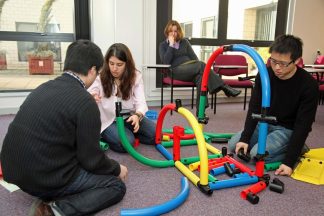
Free consultation
Let’s get started! If you’re new to experiential learning, we can provide the guidance you need to get going with confidence.
Click for a free consultation
Get in touch
Call us to have a chat
Call us now
Got a question?
Check out our FAQ’s for answers to the most common questions
FAQ’s
- AON Hewitt G.A.T.E.
- PI Cognitive Assessment (PLI Test)
- Korn Ferry Leadership Assessment
- Berke Assessment
- Ergometrics
- Thomas International
- Predictive Index (PI)
- NEO Personality Inventory
- Leadership Assessment
- Gallup’s CliftonStrengths
- Sales Personality Tests
- Personality Management Tests
- Saville Wave
- McQuaig Word Survey
- Bell Personality Test
- Myers Briggs Personality Test
- DISC Personality Test
- Management SJT
- Supervisory SJT
- Administrative SJT
- Call Center SJT
- Customer Service SJT
- Firefighter SJT
- Numerical Reasoning Tests
- Verbal Reasoning Tests
- Logical Reasoning Tests
- Cognitive Ability Tests
- Technical Aptitude Tests
- Spatial Reasoning Tests
- Abstract Reasoning Test
- Deductive Reasoning Tests
- Inductive Reasoning Tests
- Mechanical Reasoning Tests
- Diagrammatic Reasoning Tests
- Fault Finding Aptitude Tests
- Mathematical Reasoning Tests
- Critical Thinking Tests
- Analytical Reasoning Tests
- Raven’s Progressive Matrices Test
- Criteria’s CCAT
- Matrigma Test
- Air Traffic Controller Test
- Administrative Assistant Exam
- Clerical Ability Exam
- School Secretary Tests
- State Trooper Exam
- Probation Officer Exam
- FBI Entrance Exam
- Office Assistant Exam
- Clerk Typist Test
- Police Records Clerk Exam
- Canada’s Public Service Exams
- Firefighter Exams
- Police Exams
- Army Aptitude Tests
- USPS Postal Exams
- Hiring Process by Professions
Select Page
Assessment Center Case Studies Practice & Tips – 2024

Case studies are a central part of the exercises making up most assessment centers . Employers use them to provide valuable insight into the applicants. They provide a way to assess a graduate or job-seeker’s capability and their potential performance after selection. To do this, the assessment center presents the candidate with a simulated situation that might be faced on the actual job and waits to see how the candidate will respond. The information assessors collect proves invaluable to companies as they work through the screening and hiring process with the candidates who are most likely to perform well in the job opening.
What Is a Case Study Exercise?
Case studies are simulation exercises that put a candidate into situations they might actually see while on the job. The exercises can be done as a group or individually. Which it is will depend on the employer and the assessment center. The case studies typically provide information that includes financial reports, market studies, or competition analysis and other information that may relate to any aspect of the profession. It may also provide other company reports, consultant’s reports, new product research results, and more. This makes the exercise similar in some ways to an in-tray exercise though the documents are longer for a case study.
Key Features of Case Studies
The exercise can be presented at the end either in written report format or as a presentation, depending on the preference of those running the exam. The assessors then evaluate the candidate’s ability to analyze information with a logical approach to decision making and their aptitude for tackling difficult situations. From there, they score performance.
Case study exercises often are based on a few core topics. Some of these include:
- Finding the feasibility and profitability for the introduction of a new product or service
- Merger, acquisition, or joint venture related managerial decisions
- Annual report evaluation and profitability and loss analysis
- Task prioritization and problem-solving with a given deadline
Many times, the case study’s theme or scenario provides the stage for other assessment center exercises, so paying attention to what the scenario is and the information provided about it can prove helpful in further exercises. If this is the case, the problem-solving case study is likely to show up as one of the first few exercises you do after re-taking the necessary psychometric aptitude assessments for score confirmation.
Competencies Required for Case Studies
The key competencies that case study exercises usually assess are:
- Analytical thinking and assimilation of information
- Commercial awareness and Innovation
- Organization
- Decisiveness and Judgment
The goal of the exercise is to review and analyze the given information to come up with solid business decisions. The assessors will look at both the decision reached and the logical justification for the recommendations. Because of this, the test is not designed to have one ‘correct’ answer. Instead, it is concerned with the approach to solving the issue as much as it is with the solution.
This is the point in the assessment and pre-hiring process where candidates should show the recruiters what they can do. Usually, the exercise lasts around forty minutes. Employers may use either fictional examples or, in some cases, even real live projects with the sensitive information replaced for fictional information.
Due to the nature of the exercise, job-seekers and graduates taking this type of assessment should possess several key skills. They must be able to interpret large quantities of data from multiple sources and in varying formats, use analytical and strategic analysis to solve problems, formulate and commit to a decision, demonstrate commercial and entrepreneurial insight on a problem, and use oral communication skills to discuss the decisions made and the reasoning behind them. Without these key abilities, case exercises may prove challenging for individuals.
How to Prepare for Case Study Exercises?
With the large amount of information presented on assessment center case studies and the many things to consider, it can be difficult to know where to start. Particularly for those participating in a graduate assessment center case studies with no prior experience with assessment centers, the case study may seem daunting.
However, it is possible to prepare with some case study practice and by reviewing assessment case study examples similar to the ones that will be given in your assessment center. These tips for preparation and practice as well the day of will help those facing a case study assessment to do so with confidence.
Case Studies: Tips for Success
Review the advice below as you begin to prepare for the assessment center:
- If it is a group exercise , show the recruiters you can work with the team.
- For a group exercise, determine what roles individuals in the scenario are associated with and how they may interact with your or impact the analysis and decision-making process.
- Determine what information needs to be kept and what should be discarded as early on as possible.
- Manage time carefully and plan your approach based on the time available to you.
- Consider all possible solutions and analyze them carefully before choosing a decision.
- When finished, ensure that you have a solid foundation for the proposal and a plan of action to implement for your chosen solution.
- Make sure you communicate that foundation and the logic behind your decision.
- When presenting as a group, actively participate but avoid dominating the conversation or situation.
- Gather information on the organization, job profile, and any other data that could be in the case study to be prepared before assessment center day if possible.
- If you do not need to present for a group exercise, consider nominating yourself as someone who can respond to questions.
- Practice structuring and delivering presentations in a case study format before testing.
If you follow the advice above and put in enough time practicing and preparing to feel confident, you should be able to ace this portion of your assessment center. Remember that the solution is not the most important thing about this exercise. How you work with others and the reasoning behind your answer is. So, use the time you have wisely and do not overlook anything as you work to come to a good solution. As you do this, relax and use this as a chance to show the recruiters that you really know what you said you did during the interview stage . That is what this exam is about.
Assessment Center
- Written Exercises
- Job Interviews
- Competency-Based Interview Q&A
- In-Tray Exercise
- Case Studies
- Group Exercises
Related Links:
- Situational Judgement Tests (SJT)
- Job Personality Tests
- Aptitude Tests
- Civil Service Exams
- Police Officer Exams
- Firefighters Exams
- Assessment Companies
- Assessment Centers Guide – 2024
- Hiring Companies – Find an Employer

The Case Study can host a variety of cases and enables assessment takers to write detailed subjective responses to questions based on the case. You can provide your own cases or simply pick one from our battery of case studies.
We have a wide choice of ready-to-use exercises covering a range of levels and competencies. We can work with you to develop a completely bespoke case study specific to your organizational context. Or if you have your own exercises, the Case Study platform can upload those too.
This can help measure key behaviors and dimensions that align with your competency framework. You can assess key behaviors for assessment takers across a variety of industries, functions, and seniority and experience levels.

Learning & Development
High-Potential Identification

Succession Planning

Test Description
Assessment takers are required to read the case, extrapolate trends, and draw from the data provided to write the best possible subjective answers to a series of questions within the stipulated time. An assessor can then rate them online on Jombay’s assessor dashboard, where scores are sent to Jombay’s assessment scoring platform.
Testing Time
Typically between 45 – 90 minutes
Target Audience
Across all industries, functions, seniority/experience levels
Content Customization
English, Spanish, Portuguese.
+ Multiple Languages are supported
Relevant For Industries

Pharmaceutical

Manufacturing

Hospitality

Customers who have experienced this tool

Take a look at the individual report that is delivered to candidates who take the Case Study
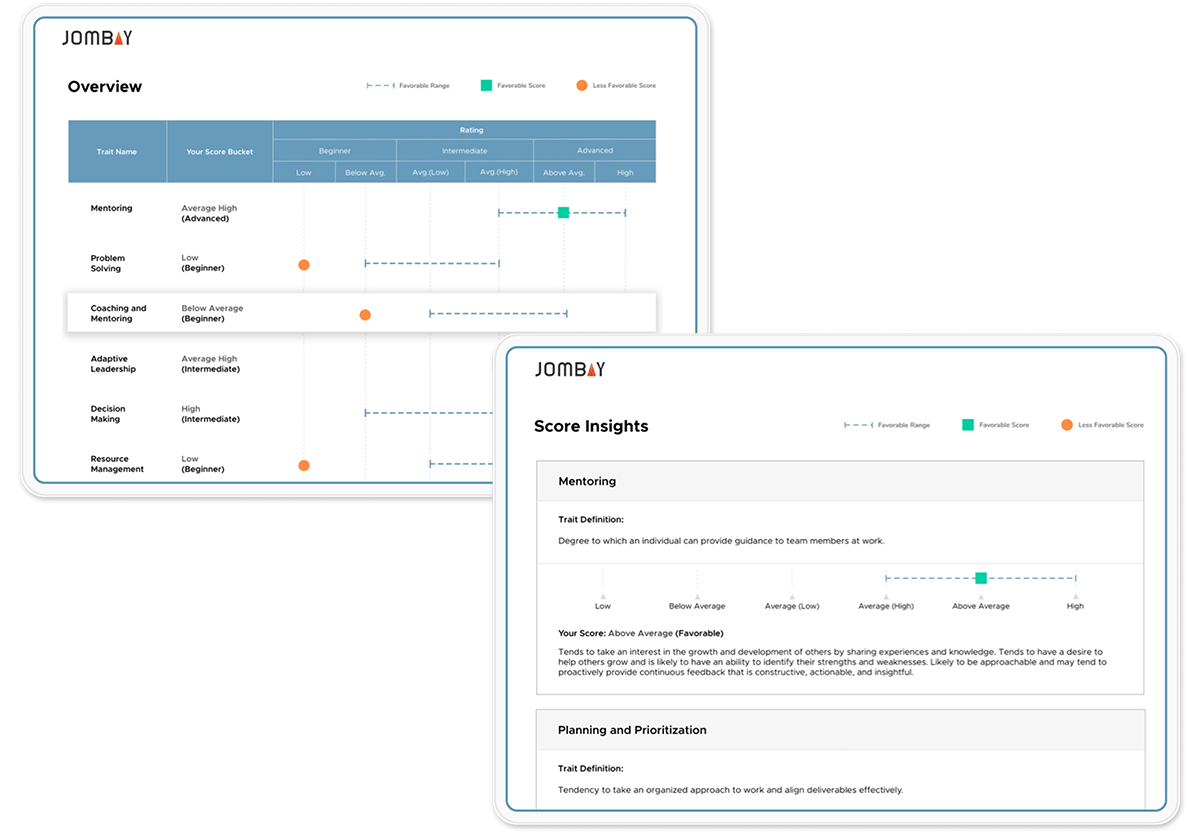
Build your custom talent solution. Through Jombay’s assessment technology platform, the Case Study can easily be combined with other assessments, simulations and video interviewing tools to create a bespoke solution for your organization’s specific requirements.
Do you want to know more about our Assessment and Development Centers? Fill out this form to get in touch.
By clicking submit you are agreeing to the Terms and Conditions.
Development
Copyright © Jombay 2022
Privacy Overview
- Skip to content
Interviews and assessment centres
Coping with case studies for graduate jobs.
targetjobs editorial team
25 Jan 2023, 13:39
Our tips on how to prepare for an assessment centre case study exercise will help you show graduate recruiters how well you could perform in the job.

Case studies at graduate assessment centres allow an employer to see you in action. An interview is all about you telling recruiters what you can do; the case study is about showing them, and so it’s arguably one of the fairest and most realistic components of a typical assessment day.
What do graduate assessment centre case studies involve?
The case study exercise can be for individuals or groups. You will usually be given some information about a work-related scenario and invited to examine the evidence before presenting your findings and solutions – either verbally (in a presentation or case study interview) or in written form. You may also be drip-fed additional information to assess and respond to throughout the allocated time.
At virtual a assessment centre, candidates are usually sent to a part of a platform to view the case study briefing pack before joining the rest of their group in a breakout room.
- Discover what virtual assessment centres involve and how best to approach them
Example assessment centre case study exercise 1
The following group exercise is a genuine investment case study. Candidates have to work together to find answers and respond to incoming news and data. They then have to make a presentation to a ‘management board’.
A publisher of scientific journals and books is looking to make a significant acquisition. It has identified a target company and approached a number of investment banks for their views on the merits of a potential deal and a target price. Based on these presentations, the publisher will decide whether to proceed with a bid and, if so, select one bank to act as their adviser.
Your team is one of the investment banks bidding to win the mandate. You need to: analyse the figures provided; to review the marketplace, your potential client (the publisher) and the target company; and to prepare a five-minute presentation giving your recommendations, eg whether to go ahead, go ahead under specific conditions etc.
Example assessment centre case study exercise 2
This is a similar example of a case study used for commercial and marketing graduate programmes. In this case, the groups are given a pack with details of the product range, sales figures, marketing campaigns and news clippings. The basic problem in this type of scenario is that a product range or the company receives some negative publicity on the eve of a new product launch or marketing campaign; assessors are interested in whether and how you would respond to it.
You are a member of marketing team at the global organisation, Choc-O-Lot Ltd. It manufactures and distributes chocolate products throughout the UK and Europe. Its flagship bar is ‘Dairy Dream’, but the business has expanded rapidly over the past eight years, launching new products and diversifying into new areas (such as running chocolate-themed experience days). The company is planning a huge brand relaunch. Just as Choc-O-Lot is about to launch a marketing campaign, an article appears in the national press alleging that Choc-O-Lot treats its workers, and members of its supply chain, poorly. It is widely shared on social media, with calls for a boycott. What would you do?
Tips for preparing for the case study exercise in advance
- Read the organisation’s graduate recruitment literature and check its website for sample case studies and recent press releases. Try to get a feel for the type of work it’s involved in and the kind of business decisions it has to make or advise clients on. Read up on issues affecting the industry the employer works in; it might give you an advantage when evaluating options.
- Practise your mental arithmetic, as you may have to demonstrate your quantitative ability without a calculator.
- Practise mock case study exercises. Go to AssessmentDay , our commercial partner, for free and paid-for example case studies. Check, too, with your careers service, as many run workshops on how to successfully prepare for case study exercises.
Get the insights and skills you need to shape your career journey with Pathways. Informed by years of conversations with recruiters, this course will give you the best tips and resources, allowing you to feel more at ease presenting to others.

Tips for approaching the case study exercise on the day
- Be clear about what you’re being asked to do. Understand what the problem is, what your role is and what your objectives are.
- Start by reading through the information pack and assessing which parts of the information are relevant – you should be able to annotate the pack. Then, you might want to list key points to be considered when coming to your solution or to brainstorm possible solutions, before considering the pros and cons to each one.
- Manage your time to ensure you complete the exercise. If you’re working in a group you could volunteer to be the timekeeper or ensure that someone else takes on this role. Allow time to prepare for the final presentation at the end of the session, if one is required.
- If you’re working in a small group you could divide up the tasks between you. You could nominate someone to assess any new information passed to the group during the course of the exercise. You could also nominate a note-keeper.
- In a group exercise, don’t dominate but do contribute to discussions. Articulate what you’re thinking so the assessors can see how you approach problems. Ask for more information or clarification if you’re unsure.
- Don’t lose sight of your objectives. The final presentation or written report should be relevant, clear and concise, and should include a summary of your conclusions and recommendations.
Tips for great presentations at graduate assessment centres
- Make sure the presentation is delivered in an appropriate style for the target audience. If your briefing scenario states that you are presenting back to a client, address the assessors as if they are clients. Consider what they are likely to know about the industry and what they don't know.
- If you are asked to make a recommendation or give a view, make this the start point of your presentation, and then present your reasoning and analysis.
- Think carefully about who and how many people will present back – switching between presenters needs to be quick and slick. If you don’t present back, nominate yourself as someone who will respond to questions.
- How to structure and deliver a great presentation at an interview or assessment day .
targetjobs editorial advice
This describes editorially independent and impartial content, which has been written and edited by the targetjobs content team. Any external contributors featuring in the article are in line with our non-advertorial policy, by which we mean that we do not promote one organisation over another.
People reading this also searched for roles in these areas:
- Graduate Jobs
- Graduate Schemes
- Internships
Related careers advice

We've got you
Online Assessment Tools
- Psychometric Tests
- Behavioral Tests
- Cognitive Tests
- Technical Tests
- Spoken English Tests
- Test Library
- Coding Tests
- Advanced Coding Simulators
- Online Coding Interviews
- Coding Test Library
- Campus Intelligence
- Student Engagement
- Screening Assessments
- Interviews & GDs
- Technical Hiring
- Sales Hiring
- Blue-Collared Hiring
Learning and Development
- High-Potential Identification
- Succession Planning
- Leadership Development
- Skills Gap Analysis
- Learning Agility & Proximity
- Training Effectiveness
ONLINE EXAMINATION
- Entrance Exam
- Semester Exam
Trusted by More Than 6000 Clients Worldwide
- Client Success Stories

- Research & Reports
- Case Studies
Top 14 objectives of recruitment and selection


AI & Future of work
Examination and Proctoring

Recruitment
- Online Interviews
- Virtual ADCs
- Request a demo
- subscribe to blog
Get awesome marketing content related to Hiring & L&D in your inbox each week
Stay up-to-date with the latest marketing, sales, and service tips and news.
By using our offerings and services, you are agreeing to the Terms of Services and License Agreement and understand that your use and access will be subject to the terms and conditions and Privacy Notice
Thank you for subscribing! Let's take the HR world by storm now!

Suvarna Kartha
Recruiter, sap.
Mettl’s assessments have been the biggest filter in our recruitment process. Their platform has helped us reach out to a higher volume our applicant numbers. Mettl constantly keeps innovating on their products and tries to introduce a new aspect to everything.
Trusted by thousands of leading brands

GET A FREE DEMO
Just drop in your details here and we'll get back to you.

Learning and Development | 10 Min Read
The Ultimate Guide To Assessment Centers
Table of contents.
An assessment center is a platform to evaluate an individual’s suitability for specific job roles. It includes several exercises like aptitude tests, personality evaluations, virtual assessment center case study simulators and interviews. It helps organizations better predict candidate performance and potential for a proposed position. A traditional assessment center involves in-person discussions and group exercises for which candidates are invited to a specific venue. With the advent of virtual alternatives, it is now possible to host such activities and interviews on digital platforms supporting remote evaluations.
On the other hand, a development center in HRM is used for organizational initiatives such as training needs identification, high-potential identification, leadership development and succession planning. While virtual assessment tests are often used for recruitment, development centers help identify professional strengths and challenges.
This comprehensive handbook dives deep into assessment centers and their key elements, their applications, process and more. You will also learn about designing an assessment development center following the best practices and using recommended tools.
Chapter 1: The fundamentals of assessment centers
Understanding acdcs- an upgrade to assessment center method in hrm.
An assessment center development center(ACDC) is a combination of an assessment center and a development center. It is a platform offering a detailed evaluation of an individual’s skills, organizational fitment and developmental needs – ACDCs work by assessing candidates on various competencies required to be successful on the job.
Assessment center development centers have three primary uses:
1. Personnel selection and recruitment
2. Identification of strengths and areas for training and development
3. Development and grooming of professionals to accelerate their growth path
Assessment center methods and types
Organizations employ one of the three major types of assessment centers. They are:

Traditional

Traditional assessment center method
Traditional assessment centers involve a physical location. As part of the assessment process, organizations selectively send employees to a site away from their workplace, with the following objectives:
- To encourage a disconnect from the daily routine
- Building employee engagement
- Helping boost employees’ self-awareness
Alternatively, traditional assessment centers may also involve inviting job applicants to the assessment center for tests and interviews.
The traditional assessment center method
Participants in a traditional assessment center in HRM undergo several activities such as role-playing, group discussions, behavioral interviews, and business case presentations. Meanwhile, experienced assessors observe and evaluate the participants based on their demonstrative behavior.
Toward the end of each activity, assessors collate their observations and discuss each participant’s performance. Once they agree on individuals’ performance, they create a report based on which participants get one-on-one feedback.
Limitations of traditional assessment center tests
Physical assessment centers are usually not feasible for all job levels, considering the stakes and costs involved. Also, traditional assessment centers can involve several logistical and operational problems. Therefore, few experts recommend this approach for a regular assessment or evaluation process.
Virtual assessment development centers
A virtual assessment development center is the online version of a traditional assessment center. It allows a holistic candidate evaluation without compromising the quality and standard set by physical assessment centers.
Virtual assessment center platforms and virtual assessment development centers accommodate a range of traditional tools used in assessment centers in a simulated virtual environment. However, wherever necessary, virtual assessors overlook the virtual assessment center activities that are conducted via assessment center software.
Virtual ACDC process
Virtual assessment and development center exercises are mapped to behavioral competencies relevant to a specific role. The exercises are administered online, followed by automated reports, eliminating logistical hassles, reducing human effort and curbing the overhead costs in conducting extensive in-person assessments.
We will discuss the applications of virtual assessment centers in Chapter 2.
Blended assessment center method
A blended assessment center method is an innovative hybrid approach that combines the best features of traditional and virtual assessment centers. It elevates the design of a traditional assessment center by combining conventional offline activities with online assessment center exercises. Resultantly, there is room for a comprehensive blended approach that supports multiple styles of learning and learners.
The process of a blended assessment center
In a blended assessment center, few competencies are mapped using online tools with life-like simulations, while the rest are assessed based on physical exercises. The physical part of the assessment remains the same. However, the total score is calculated based on the performance in both physical and virtual assessments. Ratings are compiled to provide a holistic view of the candidates after the exercises. One-on-one feedback sessions by the assessors follow this process to further development goals.
What are the advantages and disadvantages of assessment centers?
The most significant benefit of assessment centers is that they are accurate predictors of performance since candidates attempt tasks closer to real work situations. This provision offers both the assessors and the candidates an accurate picture of what may lie ahead. Thus, assessors can make better hiring decisions, and candidates gain a more realistic insight into their roles, ensuring a long employment association.
The only disadvantage is that designing a candidate assessment center involves creating customized assessment development center exercises for every organization and job role, which can be a trifle lengthy process because of multiple stakeholders’ involvement.
Chapter 2: Applications of assessment centers
As hinted in the first chapter of this guide, assessment center tests and exercises are used for three primary purposes: to predict future behavior to make better talent decisions, diagnose development needs, and groom potential employees.

The applications of various forms of assessment centers include:
- High-potential identification
- Training needs identification
Leadership development
Leadership hiring, succession planning.

Using ACDCs for Hi-Po identification
High-potential employees are 91% more valuable to a business than non-high potential workers.
Assessment centers and development centers help organizations identify and develop high-potential employees who can assume additional responsibilities and drive growth. They ensure objective evaluations via real-life workplace scenarios.

Identifying professional training needs to bridge the skill gaps
Companies that invest in employee training enjoy a 24% more profit margin versus companies that don’t.
The role of an assessment center in training and development pans out across hierarchies. To bridge the skill gaps, assessment development centers enable organizations to identify training areas for their current employees and take adequate initiatives to develop their workforce’s skills. Besides, assessment center development centers provide employees and organizations with concrete data on improvement areas. Moreover, the ACDC’s insights serve as a benchmark to further employee training and development.

Assessment centers in human resource management have proven to be an extremely insightful tool to develop professionals in leadership roles . The predictive capabilities of development and assessment center tests can help deploy exercises that test leadership competencies relevant to a specific industry or organization.
Qualities to test before selecting future leaders through the assessment centre include responsiveness to change, ability to command the respect of their peers, critical thinking and risk-taking appetite. Through a series of simulation exercises, these qualities can be tested using the assessment centre.
Akindele afolabi, how to use assessment centre in the selection and development of future leaders in your organisation.

Regular assessment center methods in HRM can also be customized into leadership assessment centers that enable organizations to hire exclusively for leadership roles. Leadership assessment centers measure key leadership attributes like ethics, civic-mindedness, innovation, team development abilities, self-development awareness, ability to negotiate and influence, etc. In most cases, assessment centers are designed to simulate day-in-the-life experiences in fictitious organizations. This helps observe candidates and their behavior in fictitious leadership roles. The insights can be immensely helpful in making the right leadership hiring decisions.

Feedback from assessment center HR helps organizations identify whether they can handle the challenges offered in the next higher position. They act as a catalyst for change, as leaders learn about the gaps between their mindsets and skills and what is required to lead effectively. At an organizational level, this information can target specific growth and development programs. This can lead to important information for succession planning by allowing the organization to assess whether it has the number of employees required to move into key roles in the future.
Chapter 3: Assessment center methods: Vital steps in the process
Assessment and development centers can address an organization’s most learning and development needs if implemented correctly. Hence, one must understand the various steps involved in rolling out the process.
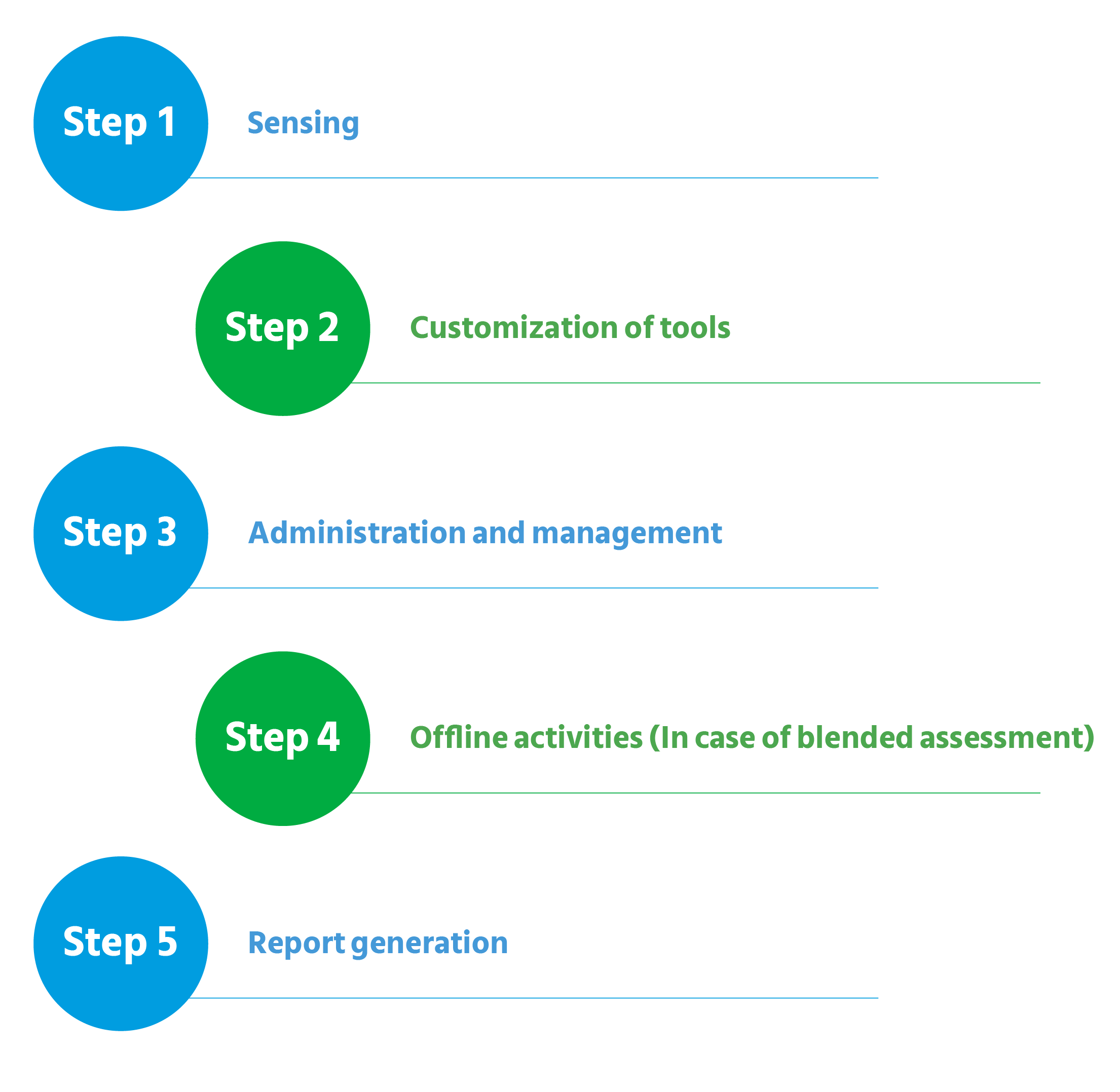
Step 1: Sensing
The sensing exercise is divided into three core phases:
1. Defining the objective
2. Underlining the job levels
3. Choosing a competency framework
Sensing phase 1: Defining the objective
Organizations should have clarity about why they want to use an assessment center development center. Concerning the various applications and possibilities elaborated in the previous chapter, an ACDC can be employed for more than one objective. A clear goal ensures that the rest of the steps follow without challenges. Choosing a type from the various assessment center examples, shortlisting the assessment and development center exercises, designing the type of questions, etc., all depend on the goal of an assessment center process.
Sensing phase 2: Underlining the job levels
The methods to assess and develop individual contributors, first-time managers, mid to senior-level management, and leadership positions vary. Ideally, the exercises must accurately reflect the variety and demands of the target role. Also, subject matter expertise is critical to establish better-suited roles for a particular assessment center technique.
Sensing phase 3: Choosing a competency framework
If organizations need to identify the skills required by the workforce to be effective in a target role, they should begin by analyzing the factors that aid employee performance. For example, competencies such as problem-solving skills, collaboration and creativity may be essential for a certain job role. However, competencies such as adaptability, strategic vision and people skills may be a priority for another job role. Hence, setting up a relevant, role-specific competency framework is crucial for the success of an assessment center process.
Sensing phase 4: Mapping competencies to relevant tools
Subject-matter experts specializing in assessment center tools and activities can help correlate various competencies to relevant assessment center exercises.
Exercises for an assessment center in HR can include situational judgment questions, personality, cognitive tools, case studies, group discussions, role-plays and various other simulation tools, online and offline. However, your assessment and development plans would fail to deliver quality results if you do not have in-depth knowledge of these tools.
Here’s an example of competency-tool mapping in a virtual assessment center development center:
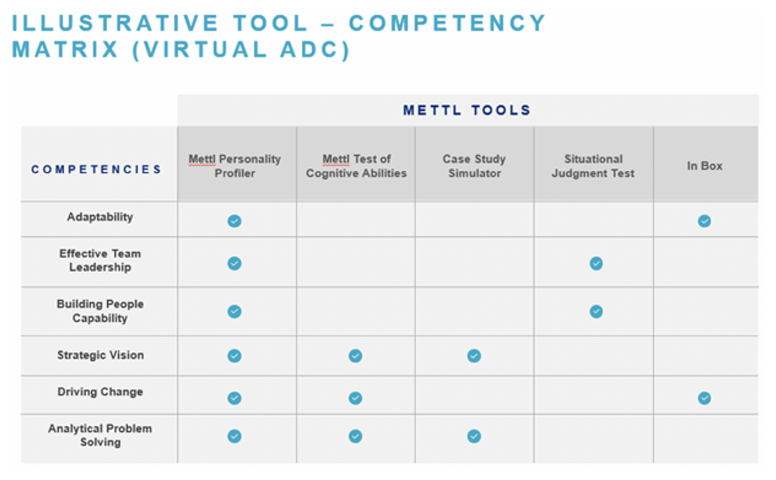
Step 2: Customization of tools
After the completion of the first three sensing phases, experts customize the assessment center tools to match the organization’s requirements. After evaluating and validating these customizations, the company is ready to roll out the assessment development activities.
Step 3: Administration and management
This step involves the deployment of resources, setting up the systems and appointing assessors. The logistics and duration of this step depend on the type of assessment center chosen by the organization. A physical assessment center’s administration and management requirements vary significantly from its virtual counterpart or a blended ACDC alternative.
Step 4: Offline activities (In case of blended assessment)
On the day of in-person activity, candidates engage in individual and group exercises onsite, in the presence of trained assessors. The assessors observe job-specific behaviors and rate participants accordingly. The assessors then collaborate their offline and online ratings in the form of a report. A short debriefing may happen on the day of the assessment center, but detailed developmental feedback occurs after the report generation.
Step 5: Report generation
Assessment center reports serve as a benchmark for employee development plans and personnel selection. Observations about behaviors and performance are made using specifically developed assessment simulations. Further action depends on these reports’ comparison and analysis.
Here are examples of insights provided by an assessment center report:
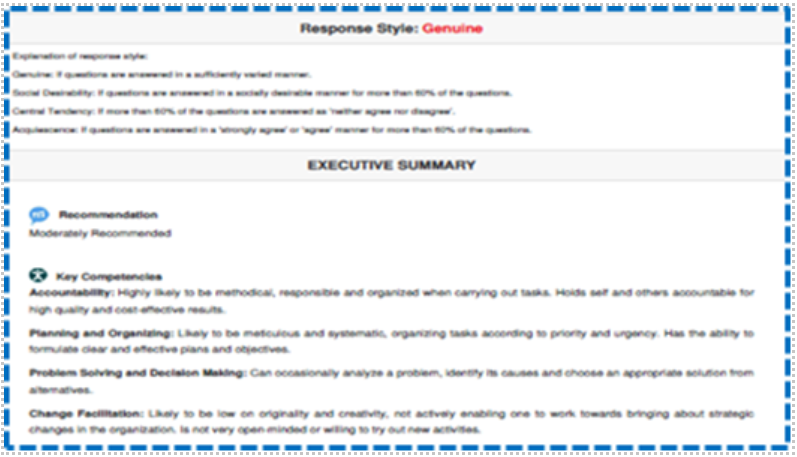
Chapter 4: Key assessment center tools
Depending on the various forms of assessment centers, i.e., physical, virtual, or blended, and their objectives, individuals are evaluated using an array of tools and exercises. Assessment center tools help gauge fitment, readiness, or developmental needs. They can range from psychometric to situational judgment, from case studies to in-box exercises, from group discussions to business presentations.
| Personality profiler | Cognitive abilities test | Case study simulator | Presentation exercise | One-to-one role-play

Personality profiler
Personality Profiler is a type of assessment that helps identify personality traits and types in the candidates. It is a valid and standardized method to evaluate an individual on the Big Five traits like extraversion, agreeableness, openness, conscientiousness, and neuroticism.
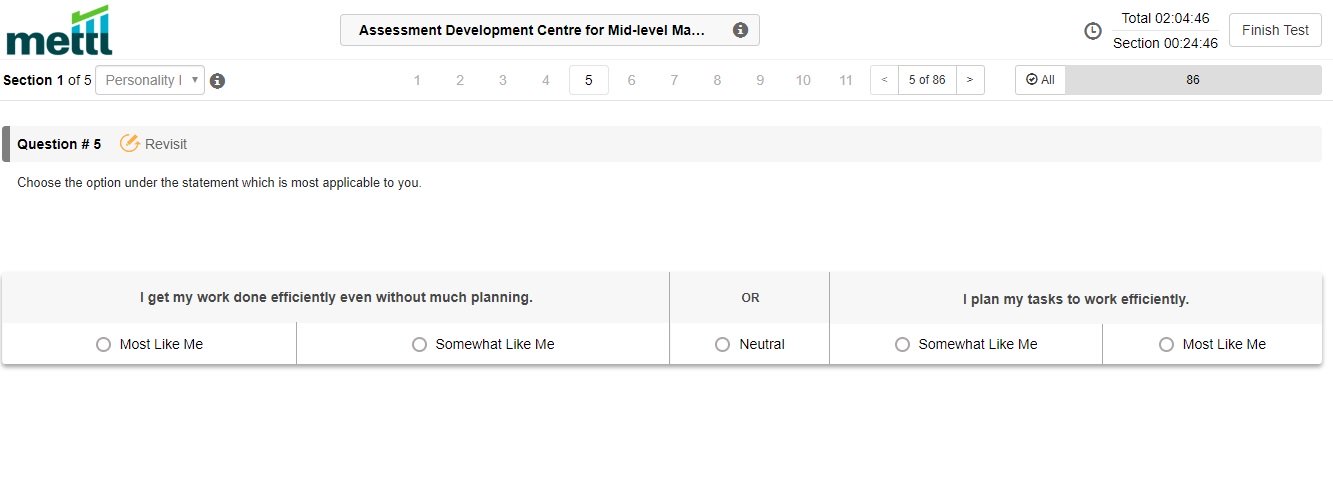
Cognitive abilities test
A cognitive abilities test measures a candidate’s cognitive skills such as observation, memory, visual processing, mental flexibility, critical thinking and decision-making. Several types of cognitive ability tests can help predict performance and determine a candidate’s job fitment.
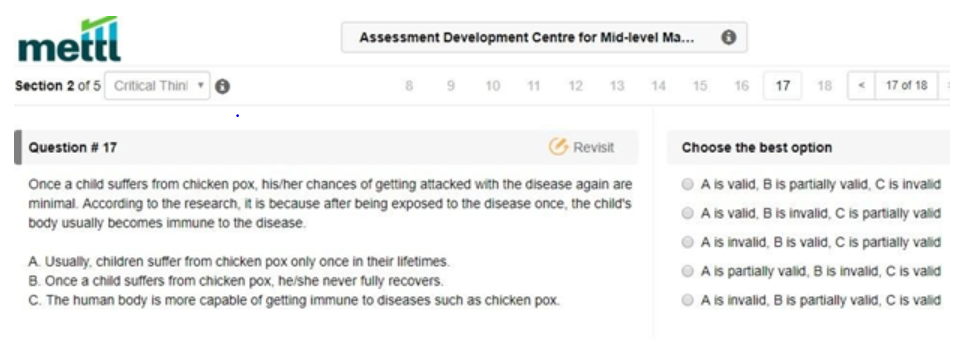
Case study simulator
In a case study simulator, candidates look through information folders, seek answers to a few questions, and solve the problem in the available time and resources.
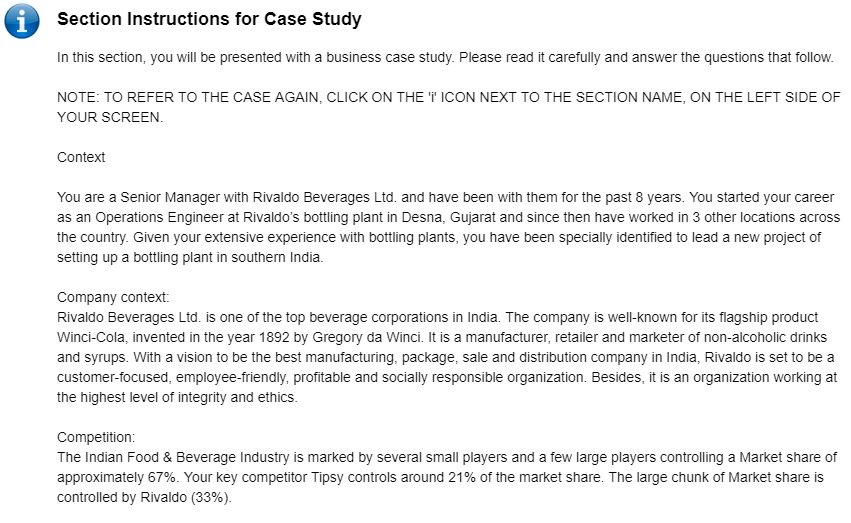
Presentation exercise
A presentation exercise tests candidates’ patience, ability to perform under pressure, deal with repeated questioning, and their time management skills.

One-to-one role-play
Role-plays put candidates in mock professional positions and situations. The exercise allows the assessors to test candidates’ responses and behavior with others when put in a spot. It is a useful way of assessing a candidate’s social and communication skills, empathy, and the ability to influence others in job-relevant situations.
Chapter 5: Top twelve assessment center exercises
The tools highlighted in the previous chapter are essential to conducting various assessment center exercises. The latter comprise a range of interactive sessions, interview rounds and assessments to gauge the candidates’ core competencies.
Examples of these exercises are:
Writing tests:
Assessment center written exercise examples include writing reports, drafting press releases, letters, emails or even proofreading texts written by someone else.
Icebreakers:
Employers strategically use this exercise to observe participants’ behavior in low-pressure situations.
Domain skills test:
Domain skills tests or domain expertise tests cater to multiple job roles and job levels. They test a candidate’s grasp on domain expertise, technical knowledge, and efficiency in their line of work.
Interviews:
Assessment center interview questions are chosen to understand the candidate’s industry knowledge, skill level, experience, etc.
Situational judgement tests:
They assess a candidate’s ability to deal with real-life work-related situations.
Role-plays:
They offer a great way to observe candidates in high-pressure work situations.
Case study exercise:
This exercise evaluates various approaches to a specific problem and the ability to derive a fruitful/logical outcome.
Technical assessments:
They help assessors understand how well a candidate is likely to excel in a specific industry or discipline.
Inbox exercise:
Inbox exercises are simulation tests where candidates receive emails, calls and memos, which they must attend to by prioritizing, organizing and scheduling in a limited time.
Psychometric assessments:
Tests to measure cognitive intelligence and personality traits ensure a holistic candidate evaluation.
Presentations:
As stated in the previous chapter, exercises in the form of spot presentations and planned presentations offer critical insights into participants’ expertise, experience and key professional competencies.
Group exercise:
The purpose of such an exercise is to observe candidates and their abilities to respect, collaborate and engage with other people.
Get detailed insights into assessment center exercises
Chapter 6: the future of assessment development centers.
As the talent management landscape continues to evolve and adopt modern technologies, human resource experts can now leverage technology to train and develop their workforce. To avoid the consequences of relying on a traditional assessment center, organizations are gradually adopting online tools to expedite the process, in addition to giving credible outcomes at par with the physical approach. Virtual assessment centers can overcome most pitfalls in physical assessments while greatly expanding the potential pool of applicants available to the organization.
A globally competitive marketplace mandates organizations to sync their strategic aims with the market requirements to ensure business continuity. Virtual assessment centers can prove to be efficient and effective in achieving the desired results. It is a time and cost-effective medium , and the assessments can be taken remotely . Meanwhile, blended assessment centers that incorporate both technological and human elements are increasingly becoming a go-to option for vital organizational planning initiatives.
The role of assessment centers in organizations is constantly growing. From hiring to using assessment centers in performance appraisals, companies are constantly experimenting with the online assessment center platforms and tools.
Moreover, organizations are increasingly undertaking the assessment center approach due to the following reasons:
- Relevant content in a simulated environment: Assessment centers prove to be more efficient since they effectively measure participants’ competencies in a simulated environment. Additionally, candidates can easily relate to the assessment center content as the replication of real-world scenarios appears realistic to them. Assessment centers prove to be a reliable solution, especially while assessing mid to senior management, leadership roles and others with high-stakes job roles.
- Constructive & actionable feedback: Assessment centers stand out among other forms of assessments. A standard assessment center is not only aimed at pre-assessment but employee development tools. The performance and their scores are collaborated by assessors, after which they are given constructive feedback. This is contrary to traditional forms of assessments where the task ends with report generation. The one-on-one feedback sessions act as a mirror for test-takers and help them carve a development journey. A group-level analysis helps organizations identify a particular department’s training needs.
How Mercer | Mettl can help
Mercer | Mettl is committed to the evolving needs of talent management and development. Thus, we offer two methodologies for conducting hassle-free assessment centers – virtual and blended . With subject matter experts, a pool of experienced assessors, and a suite of interactive tools and exercises, Mercer | Mettl can play a significant part in the hiring, training and development of your workforce.
What is an assessment center example?
An example of an assessment center is a virtual interactive conference where professionals discuss, or debate a given topic. Such exercise helps assess communication skills, personality traits, ability to work in a group and lead, industry knowledge and other vital competencies. On-site case study analyses and planned presentations to elucidate specific ideas are also candidate assessment center examples that help in recruitment, L&D (Learning & Development) and HiPo (high potential) identification.
What are the tips to ace assessment center exercises?
The twelve best tips to succeed at an assessment center are: 1) Research: Learn all you can about the type of assessment center, the agenda, the company’s vision and mission, expectations from your role, etc., 2) Prepare: As part of your core preparations for an assessment center test, it is vital to rehearse your ideas and presentation skills, 3) Follow the best practices: This applies to group activities and discussions, virtual assessment platforms and your overall professional behavior, 4) Double-check your connectivity: A speedy internet connection is imperative to succeed in any online assessment center activities, 5) Be punctual: Whether it is a virtual, on-site or blended assessment center, showing up five minutes before the scheduled time always makes things smoother. 6) Practice MCQs (Multiple Choice Questions): It would be extremely helpful if your assessment center exercises include aptitude tests or other psychometric assessments, 7) Ensure technical performance: The best way to prevent embarrassing tech faux pas is by testing any equipment or drives well before the assessments begin, 8) Be ready for surprises: Even if you thought you were 100% ready for an assessment center, there is no way to know what could go differently. Hence, it is wise to be prepared for unexpected challenges and not let them throw you off your game, 9) Take a proactive approach: Most assessment centers focus on leadership qualities and high potential. Therefore, being proactive will allow you to stand out and help you display your passion for the job, 10) Avoid negative self-talk: If you are not mindful of the way you speak to yourself, you may end up hurting your performance at an assessment center. It is crucial to stay motivated and use the right words when giving yourself a pep-talk before any assessment center exercise.
What to expect from an assessment center?
If you are a candidate, an assessment center can be an excellent platform to gain insights into the company culture, the type of work and other crucial details about the workplace. Therefore, while the assessment center design caters to candidate evaluation, you can use it as an opportunity to gauge the company as well. You can expect interviews, interactive sessions, briefings about the assessment process, assessor introductions and details about the selection criteria. If you are an employee participating in assessment centers, you can expect stimulating industry discussions, test of core competencies for identifying skill gaps, your employer’s plans, etc.
Originally published December 4 2019, Updated August 1 2022
D'ipanjenah Ali
Assessment center development center.

Mercer | Mettl's VADC: The Future of ACDCs
Assessment Center Development Center, commonly known as ACDC, is a comprehensive tool used by organizations to evaluate prospective or current employees for workforce management and planning. ACDCs can be implemented virtually, physically, or in a blended format, using a suite of assessment tools.
Related posts

Unlocking the potential of job architecture

Measure what matters with SmartADC: The assessment center platform of tomorrow

Eleven most useful assessment center exercises in the virtual era

Virtual assessment center: The future of assessment & development centers

5 Practical Assessment Centre Exercises

Assessment Centre Group Exercises: Examples and Tips for Success
Group exercises are an important part of assessment centre events for a wide variety of roles and companies.
Many people find it difficult to perform well in a group, but with the right practice and preparation, you can stand out from the rest and make a strong impression on recruiters.
In this free assessment centre group exercises guide we will show you:
- 3 common types of group exercises you could face at an assessment centre
- 2 real-world assessment centre group exercise examples
- 5 expert tips to help you stand out on the day
You can find our recommended assessment centre group practice exercises here .

What is an assessment centre group exercise?
The group exercise is one of several assessment centre exercises you may have to take part in on your assessment day.
You’ll be placed in a random group of 8-10 candidates and must work together to complete an activity in front of assessors.
The exercise measures your ability to work in a team, contribute, delegate and solve problems.
Each candidate is assessed individually on skills required for the role they are applying for, such as leadership, communication, influence, creativity, problem solving and commercial awareness.
Compared to other assessment centre activities like aptitude tests and interviews , the group exercise tends to be one of the most challenging because of its competitive nature.
You’ll be working with a mixture of personality types, and everyone wants to make a great impression.
Luckily, we’ve got plenty of tips, info and advice to help you approach the group exercise with the right attitude. Keep reading to prep yourself for success!
What to expect at assessment centre group exercises
There are three common types of group exercises you could face at an assessment centre:
- Case study or role play
Where you play out an imaginary scenario to try to overcome its particular challenges and get to an outcome that the majority of the group is happy with.
Where you must discuss and come to a conclusion about a work-related issue. You may also have to present your solution back to the assessors as a group.
A more informal exercise where you discuss a general topic, usually related to news or current affairs.
No matter which type of group activity you take part in, the format will be largely the same.
Before you start the exercise, you’ll get a short amount of time to read the brief.
Everyone in the group will be working with the same general information and scenario, but you’ll usually also be assigned a specific position to take or given some unique extra information to guide your interactions.
Then, you’ll join the other candidates to complete the activity in front of your assessors.
The exercise itself will normally go for about 10-20 minutes.

Assessment centre group exercise examples
Now let’s take a look at some examples of real assessment centre group exercises. Try these at home with some friends – it’s a great way to practise!
Here’s a general case study group exercise from JobTestPrep :
Group Exercise 1
And here’s a more in-depth, business-related group exercise from AssessmentDay :
Group Exercise 2
Get even more examples and the best assessment centre group practice exercises here !
Group exercises top tips video
Have a watch of this video from Career & Skills, these are some top tips from their graduate recruitment team…
5 pro tips to stand out at assessment centre group exercises
#1: contribute but don’t dominate.
It’s very important that you speak up and make your voice heard during the group activity.
Recruiters are assessing your contribution to the group, so if you stay in the background and let others lead the discussion, you won’t get the marks.
But at the same time, no employer is looking for someone who’s loud, overbearing and dominates the conversation.
Make sure everyone is included equally and gets a chance to speak, and if you notice someone sitting quietly and not saying anything, encourage them to contribute.
Be aware of your personality and be mindful of others in the group. If you’re naturally quite shy, or tend to be more aggressive, then you need to adjust your communication style to find a balance between the two.
#2: Follow instructions carefully
Read the brief thoroughly before you start and make sure you’re clear on the instructions. Ask for clarification if you’re unsure about anything.
During the exercise, try not to let the discussion get carried away or off topic.
You’ll want to stay totally on track with the brief you were given, so prioritise what topics or discussion points need to be worked through, and stick to them. Keep the time limit in mind!

#3: Do your research beforehand
Get more marks for your commercial awareness by finding out about the employer and role you’re applying for.
Show that you understand the company, what they do and what they value by using that information during the exercise and relating it to the task at hand.
Assessors are looking for people who not only understand the business and industry, but who also act appropriately for the role.
Make sure you offer suggestions and recommendations that make sense for the company and for its specific business environment.
#4: Don’t be afraid to take the lead
While it’s essential to not dominate the group or boss people around, you should still try to show your leadership skills in natural and positive ways.
For example, offer to keep track of the time at the beginning of the exercise, or proactively include other group members in the conversation by asking them what they think.
This shows you have initiative and don’t mind taking on responsibility, which can make you more memorable to assessors and give you a valuable leg-up over the competition.
#5: Practice, practice, practice!
And of course, the best thing you can do to prepare yourself for your assessment centre group exercise and stand out from the crowd is to practice.
Gather some friends together and work through the group exercise examples above, and then find even more practice exercises here .
You’ll get more confident, calm and comfortable with the exercise, which in turn will help you perform better on the day.
Some more guides to help you succeed…
- Numerical Reasoning: Numerical Reasoning Test Guide: 5 Proven Tips to Succeed
- Verbal Reasoning: Verbal Reasoning Test: What You Need to Know to Pass
- UKCAT: UKCAT Test Guide: 4 Secrets to UKCAT Success 2020
- Watson-Glaser: Watson-Glaser Test: Everything You Need to Know to Pass
- Mechanical Comprehension: Mechanical Comprehension Test Guide 2020

- Log in
- Site search
Assessment centres
Giving employers the chance to compare the performance of lots of candidates at the same time, assessment centres are a very common feature of graduate recruitment
What is an assessment centre?
An assessment centre (or assessment day) is a combination of tasks and activities that test your suitability for the job. You'll have the chance to demonstrate a wider range of skills than you would have been able to during a traditional face-to-face interview.
Hosted over anything from an afternoon to two days, assessment centres are often the final stage of the selection process for large graduate recruiters. You'll usually be joined by six to eight other candidates, but it's important to keep focused on your own performance.
What happens at an assessment centre?
The majority of assessment days are held in person and can be anywhere from the employer's offices to a hotel or training facility. You will work both individually and as part of a group on a variety of exercises, including:
- case studies
- group discussions
- in-tray exercises
- presentations
- psychometric tests
- social events
- written tests.
Find out more about interview tests and exercises .
Example assessment day
Assessment centres vary in length, style and content, but an example assessment day might be as follows:
- 09.00 - introduction
- 09.15 - employer presentation and group ice-breaker exercise
- 10.00 - psychometric tests
- 11.30 - individual task: in-tray exercise
- 12.45 - lunch
- 13.45 - group exercise: case study
- 14.45 - assessment interviews
- 16.15 - individual presentations
- 17.15 - evaluation
- 17.30 - finish.
How will I be assessed?
Employers don't just assess you against job competencies. They also aim to ensure that you're the right fit for the company. Being scrutinised for such a long time can be challenging, but assessment centres allow you to compensate for poor performance in one task by excelling in another.
Key skills that employers look for include:
- adaptability
- analytical thinking
- commercial awareness
- communication
- decision-making
- negotiation
- organisation
- time management.
Assessors, who are usually a mix of HR consultants and line managers, score your actions against competency frameworks. They discuss all aspects of your performance before reaching a final decision on whether or not to hire you. All, several, one or none of the candidates could be successful.
You may find out there and then whether you've got the job, or it could take a few days, but the employer will let you know when you're likely to hear the result. If you've been unsuccessful, make sure you ask for feedback so that you know what you need to work on for the next assessment day.
How do I prepare?
As with interviews, assessment centre preparation is vital. It's important that you:
- Call the organisation's graduate recruitment team if something is unclear.
- Give yourself time to complete and practise any material that you've been asked to prepare.
- Identify which skills, interests and experiences the employer is looking for by revisiting the job description and any other material that the company has sent you.
- Practice potential exercises with a friend or family member.
- Read the organisation's website, social media profiles and key literature (e.g. business plan, financial reports and corporate social responsibility strategy), ensuring that you're prepared to share your views and ideas.
- Reflect on your first interview, asking the company for feedback, reviewing your performance, and noting any questions or situations that caused you difficulty.
- Research the news, trends, competitors, history and opportunities of the organisation and its job sector.
- Review your CV and application form.
- Visit your university's careers and employability service for further guidance, as many have practice resources, offer one-on-one coaching and host mock assessment centre interviews.
Choose your outfit the night before and get plenty of sleep. Plan your journey, aiming to arrive at least ten minutes early. If the event is online make sure all your equipment works and you are familiar with the software that the assessment centre is being held on. Completing a 'dry run' also combats nerves.
For free practice tests see psychometric tests , or get advice on preparing for and answering some of the most common interview questions .
Assessment centre tips
It's important that you:
- are assertive during all exercises
- don't dwell on any mistakes, instead concentrate on performing well in the next task
- ensure that the assessors can see your working methodology
- don't worry about the other candidates, and instead focus on putting your key skills forward
- draw others into group discussions
- ensure that you understand the requirements of each task by quickly digesting the brief, and revisit this once you understand the overall challenge
- join in with discussions, even at 'informal' mealtimes, and ask other candidates about university if you're struggling for conversation
- maintain a friendly and polite manner with everyone you meet, and remember that you're always being assessed
- relax and let your personality shine, as assessors warm to individuality.
Find out more
- Explore how to prepare for an interview .
How would you rate this page?
On a scale where 1 is dislike and 5 is like
- Dislike 1 unhappy-very
- Like 5 happy-very
Thank you for rating the page

- Numerical Reasoning
- Verbal Reasoning
In-Tray Exercises
- E-Tray Exercises
- What To Expect
Group Exercises
Presentations.
- Assessment Centre Tips
- How To Prepare For An Interview
- How To Behave During An Interview
- Hope To Cope With Nerves
- PwC Assessment Centre
- KPMG Assessment Centre
- EY Assessment Centre
- BDO Assessment Centre & Online Ability Tests Guide
- IBM Assessment Centre & Study Guide
- GSK Assessment Centre
- Mastering the Teach First Assessment Centre 2024: Ultimate Prep Guide
- MI5 Assessment Centre
- Network Rail Assessment Centre
- Fast Stream Assessment Centre
- PSNI Assessment Centre
Psychometric Tests
- Numerical Reasoning Test
- Verbal Reasoning Test
- Logical Reasoning Test
- Abstract Reasoning Test
- Inductive Reasoning Test
- Watson-Glaser Test
- How to Prepare for UKCAT Exam? – A Definitive Preparation Guide with Practice Tests, Tips & Tricks & More
- Mastering Mechanical Comprehension Tests: Tips, Practice, & Insights
- Diagrammatic Reasoning
- Spatial Reasoning Tests
- Numeracy Skills Test (QTS)
- Literacy Skills Test (QTS)
- SHL Numerical Test: 5 Essential Tips for Guaranteed Success
- RAF Aptitude Test
- Army BARB Test
- How to Prepare for Prison Officer Selection Test?
- Network Rail Online Tests
- PSNI Initial Selection Test
- Personality Tests

What Is Mean By Assessment Centre? – Definition Explained
As part of your job application, you may have been invited to an assessment centre by your potential employer. What is an assessment centre and how does it affect your chances of being hired?
In this guide, we’ll tell you more about what assessment centres involve and how you can prepare so you can showcase your skills effectively to secure the job you want.
Table of Contents
What Is An Assessment Centre?
Assessment centres are used by employers and recruiters to test employees and interviewees so they can find the best fit for their company. The assessment can be a combination of physical tasks and a series of tests, and it’s often the final hurdle in the hiring process after the initial application and interview.
Assessment centres are not specific places and can be held anywhere and can range from a few hours to a few days, covering a wide array of skills not accessible in a standard interview. Essentially, an assessment centre is akin to a series of tests and exercises that an employer will put selected candidates through.
Join JobTestPrep Premium - #1 Practice Assessments
Why Recruiters Use Assessment Centres
Companies use assessment centres as a way to better examine top potential employees, ensuring a better fit for the position they’re looking to fill. This process lets them see ahead of time how well the applicant will do and if there will be any conflicts with them.
These assessment centres also give recruiters a chance to see how you’ll react to real-life situations. They assess how you work within a group and on your own with complex tasks or situations that can happen within the workplace.
In addition, assessors get to see first-hand how you do, as information on an application does not provide an entire picture of your capabilities.
This is an opportune time to display skills and knowledge to employers, showing why you are a great fit as an employee and how you can be beneficial to their organisation.
Assessment centres also allow an equal opportunity for all interviewees with similar skill sets on paper. While interviewees may have the same or similar resumes, how each individual works is not determinable on paper.
What Happens In An Assessment Centre?

Assessment centres often involve a few different events that applicants must go through. Many companies will even make accommodations for interviewees should the process require more than 24 hours.
You may be required to go through a series of interviews during your time at the assessment centre. While not all companies do this, you should prepare for them in any case. There could be biographical, technical, or both.
A biographical interview will be focused on you: your skills, education, work history, strengths and weaknesses. Technical interviews will focus on questions about the position which you applied for: i.e., engineer, computer IT, etc.
Tests are inevitable, but the type and number of tests you take will depend on the position you’re applying for and how you do on the initial test.
These usually take the form of a business simulation where you’re to perform a task typically done by a team member and to perform it accordingly. These exercises will be similar to standard tasks relating to the field of position you’re applying to.
There will be a time limit to perform the tasks, so prioritise the most important aspects first, but do not worry yourself over completing everything. There may be a de-briefing on your exercise, and your assessor may ask about how you did the tasks and why you did them a certain way.
These tests vary widely, with no way to prepare for them all. The best solution is to find out which ones are most prevalent in the position you’re applying for and prepare for that one solely.
These tests will focus primarily on your writing ability, basic principles of the technical side of the role, or your basic arithmetic.
These can be in the form of a case study and are used to see how you work with your peers to determine your leadership and teamwork capabilities.
Case Studies
These can be individual or group exercises that test how a candidate deals with large amounts of information to make logical business decisions.
Depending on your position, you may be asked to prepare and present a demonstration to assess how you work with and analyse delivered information.
Social Event
This can occur as a lunch, dinner, or break session during the day. Recruiters will be assessing your business social skills and how you interact with others. It’s the perfect time to learn more about the organisation and to ask questions.
How Will I Be Assessed?

Throughout the day of your assessment, recruiters will look at a multitude of skills, abilities, and traits that you and others possess aside from what is required for the position being tested for. By doing so, they ensure they’re finding the best overall fit for their company.
Your scores will be compared to a set of competency frameworks that assessors will discuss before selecting the most compatible applicants.
They look for these key skills when testing and examining scores:
- Adaptability- your ability to adapt to changing circumstances and scenarios within the company or work environment.
- Analytical thinking- how well you identify problems, extract relevant information and apply that information to create a solution.
- Commercial awareness- Your understanding and knowledge of how the business generates income and how you can help it achieve goals and expand.
- Communication- how well you communicate with members of the workplace, management, and consumers (depends on the field of work).
- Creativity- the way in which you come up with solutions to problems, concept ideas, or products (depends on the field of work).
- Decision-making- the speed and accuracy of your decisions in stressful situations or difficult tasks.
- Leadership- how well you lead a team of coworkers on a project or task.
- Negotiation- how effective you are at negotiating difficult situations with others and how you conduct negotiations.
- Organisation- how well you keep your assignments organised, and if applicable, a team organised.
- Persuasion- how you convince teammates or potential clients to new methods, ideas, or products.
- Planning- your methods of planning assignments, assigning tasks, and projects individually or within a group.
- Teamwork- your ability to work with others on assignments, projects, and tasks to achieve the goal.
- Time management- your ability to manage time within the workspace, on assignments, and within a group.
Each position will have specific requirements, and assessors will stick to those requirements when looking for new hires during the assessment centre. Your performance will be discussed and analysed thoroughly at the end of the day. You may find out that day or within a few days whether or not you will receive the position.
How To Prepare For It?

Preparation is the key to success. When preparing for an assessment centre, you’ll want to gather as much intel on the company, the position, and the skills that are required for the position.
Go Over the Practice Material
If you can, ask a hiring representative what criteria are most important for the position and what areas should be focused on the most. Then, gather up reading materials, practice tests, and exercises that are relevant to the position.
Job Test Prep has guides and practice resources to help you in your preparation. With expert advice, case studies and other resources, you’ll be able to get an advantage over your competitors.
Once you have the materials you need, practice with friends or family, and work on any areas you have more difficulty with. Work on areas you struggle in and know of by doing practice runs and exercises. If you struggle with time management, research and test out ways to improve yourself.
Get Feedback on Your Initial Interview
Ask for feedback on your first interview to help you identify any areas that need improvement. For example, were you fidgeting, avoiding eye contact, etc.? Then, have practice interviews with the help of a family member or friend to improve those areas.
Read Up On The Organisation
Do research on the company you’re applying for. Check out their website, social media pages, key literature (business reports, etc.), opportunities within the organisation, trends, and even the competing companies to get a grasp on what they’re looking for, how the business is as a whole, preparing you to share your ideas and views.
Get Plenty Of Rest
Being well rested the night before will keep you alert and functional, allowing you to be at your best and showing the recruiters your potential. Plan everything out the day before: what you’ll wear, when and how you’ll get there, where you’ll stay (if the assessment will require more than a day), and what you’ll bring with you.
Assessment centres are an increasingly common step in many companies’ hiring process. There’s no need to be too fearful of it, especially when you can prepare beforehand with Job Test Prep’s resources .
Ultimately, it’s important to ensure that you are familiar with what’s expected and what you’ll go through at the assessment centre and show up confident and ready to show off your skills.
Sarah is an accomplished educator, researcher and author in the field of testing and assessment. She has worked with various educational institutions and organisations to develop innovative evaluation methods and enhance student learning. Sarah has published numerous articles and books on assessment and learning. Her passion for promoting equity and fairness in the education system fuels her commitment to sharing insights and best practices with educators and policymakers around the world.

Visit our Contact Page
AssessmentCentreHQ Unit 57 Minerva Ave, Chester, CH1 4QL
- NUMERICAL REASONING
- VERBAL REASONING
- ASSESSMENT CENTRES
- APTITUDE TESTS
- PRIVACY POLICY
Featured On

© Copyright 2023 AssessmentCentreHQ – All Rights Reserved

The Future of Consumption
How Technology, Sustainability and Wellbeing will Transform Retail and Customer Experience
- Open Access
- © 2024
You have full access to this open access Book
- Kristina Bäckström 0 ,
- Carys Egan-Wyer 1 ,
- Emma Samsioe 2
Department of Service Studies & Centre for Retail Research, Lund University, Lund, Sweden
You can also search for this editor in PubMed Google Scholar
Department of Business Administration & Centre for Retail Research, Lund University, Lund, Sweden
- Discusses future trends in consumption, particularly the impact those trends will have on the ways we shop and much more
- Combines academic and practitioner perspectives on future consumption trends
- Highlights what retailers are already doing to prepare for the consumption of the future
- This book is open access, which means that you have free and unlimited access
90k Accesses
2 Citations
11 Altmetric
Buy print copy
- Compact, lightweight edition
- Dispatched in 3 to 5 business days
- Free shipping worldwide - see info
- Durable hardcover edition
Tax calculation will be finalised at checkout
Table of contents (24 chapters)
Front matter, introduction: the future of consumption.
- Kristina Bäckström, Carys Egan-Wyer, Emma Samsioe
The Intersection of Sustainability and Technology in the Context of the Digital Marketplace
- Hela Hassen, Precious Akponah
Smart Signage: Toward a Transformative Model that Effectively Generates Consumer-Product Relationships
- Franklin Velasco, Hanna Marriott
Into the Metaverse: Technological Advances Shaping the Future of Consumer and Retail Marketing
- Hossain Shahriar
Consumer Trust and Platformised Retail Personalisation
- Stefan Larsson, Kashyap Haresamudram
Friend or Foe? How Buy-Now-Pay-Later Is Seeking to Change Traditional Consumer-Retailer Relationships in the UK
- Ruffin Relja, Anita Lifen Zhao, Philippa Ward
The Future of Grocery Retail
- Rickard Sandahl
Toward a Packaging-Free Society: A Historical Journey of Institutionalization and the Way Forward
- Ozan Ağlargöz, Feyza Ağlargöz
Trending Seaweed: Future Opportunities in Retail?
- Cecilia Fredriksson, Annabell Merkel, Filippa Säwe
Grocery Retailers’ Approaches to Discussion on the Food Waste Issue on Social Media
- Ulla-Maija Sutinen, Elina Närvänen
Sustainable Consumption in Taiwan and China: Drivers and Impediments
Digitalization: a potential tool for sustainable consumption.
- Matthias Lehner, Jessika Luth Richter, Oksana Mont
The Challenge of Overproduction and Overconsumption
- Gabriella Wulff
Create Tomorrow’s Vintage
- Kevin Gelsi, Sandya Lang
The Future of Wellbeing: Value Creation in Digital Mental Health Services
- Alisa Minina Jeunemaître
No Cash, No Coins, No Cards, But You: Biohacking the Future of Payments
- Vitor Lima, Russell Belk
- consumer behaviour
- sustainability
- artificial intelligence
- machine learning
About this book
This open access book presents three future consumption trends—technology, sustainability, and wellbeing—and discusses what impact those trends will have on the ways we shop.
What will be important to the consumers of the future? And how will their retail experiences look and feel? Will technology, sustainability, and wellbeing trends fundamentally change how we consume? And how should retail managers respond to these trends in order to provide the customer experiences of the future? Blending academic perspectives with reflections from innovative retailers, this book explores all these questions and more.
Essential reading for retail managers who want to know how future consumption trends will affect the industry, this book also benefits students and researchers of retail and consumption who want to better understand how these interdependent fields are linked.
“I really must recommend this book, which is an insightful and topical book for all practitioners and scholars seeking answers and new perspectives on future challenges within retail and marketing. Never has the retail industry been challenged from so many different directions and it is important to be prepared for the changes that are coming. This book goes through the major trends in the retail industry: the development of technology, sustainability challenges and, finally, the future customer’s demands for better experiences. So be prepared, be updated. Read the book and you will have a huge competitive advantage for the future.” (Martin Moström, CEO, Retail House, Sweden)
“This book is a valuable collection ofchapters by leading researchers and practitioners from a variety of fields and perspectives, exploring a range of phenomena that are likely to transform the future of consumption. It is both multifaceted and clearly structured to reflect the three key trends of technology, sustainability and well-being. These trends cover phenomena ranging from more established technologies such as digital signage to those with more uncertain trajectories such as the metaverse, from the prospects of seaweed to the challenges of reducing food waste, and from individual consumer wellbeing to digital mental health ecosystems. The book shows how each of these major trends, individually and in combination, is contributing to shape consumer experiences and retailing. It is essential reading for anyone who wants to understand the future of consumption and is therefore highly recommended.” (Professor Johan Hagberg, University of Gothenburg, Sweden)
“Too often we take retailing and consumption for granted. It is only when things go wrong (ranging from pandemics to global economic and geopolitical challenges) that we see how central these multi-faceted activities have become to the functioning and evolution of society. In this book, authors drawn from a wide range of backgrounds provide fascinating contemporary perspectives on the nexus between retailing and consumption. The rich variety of topics is compelling, and the insights and implications presented will prove instructive to students, academics and practitioners alike.” (Jonathan Reynolds, Said Business School, University of Oxford, UK)
“The core purpose of retailing is to satisfy the needs and desires of consumers. It is therefore essential that retailers keep abreast of the evolving values, expectations and behaviours of contemporary consumers. We are in a phase of significant change in the socio-economic environment, so the need to look forward and explore new relationships andinteractions between retailers and consumers is more critical than ever.”
This edited anthology brings together an important set of insights relevant to the future of consumption and retailing. The core to successful retailing remains the delivery of an excellent customer experience. The need for retailing to deliver not just the ‘traditional’ values associated with products and services but to respond to important emergent themes around sustainability and wellbeing, and to consider how technology contributors to (or detracts from) delivering customer experiences based on these values will shape retailer-consumer relationships in the years ahead. (Steve Burt, Professor of Retail Marketing, Institute for Retail Studies, University of Stirling, UK)
“The retail industry is constantly evolving, always with the fast-changing needs of the customers at heart. This book gives a great overview of how future trends within technology, sustainability and well-being can impact the development of retail. No matter if you’re a retailer or a student, it’s an interesting read with inspiring examples and best-practises that can inspire to action – both for businesses and consumers.” (Jesper Brodin, CEO Ingka Group I IKEA, Sweden)
Editors and Affiliations
Department of service studies & centre for retail research, lund university, lund, sweden.
Kristina Bäckström, Emma Samsioe
Department of Business Administration & Centre for Retail Research, Lund University, Lund, Sweden
Carys Egan-Wyer
About the editors
Kristina Bäckström is a Senior Lecturer at the Department of Service Studies & Centre for Retail Research, Lund University.
Carys Egan-Wyer is a Senior Lecturer at the Department of Business Administration & Centre for Retail Research, Lund University.
Emma Samsioe is an Associate Senior Lecturer at the Department of Service Studies & Centre for Retail Research, Lund University.
Bibliographic Information
Book Title : The Future of Consumption
Book Subtitle : How Technology, Sustainability and Wellbeing will Transform Retail and Customer Experience
Editors : Kristina Bäckström, Carys Egan-Wyer, Emma Samsioe
DOI : https://doi.org/10.1007/978-3-031-33246-3
Publisher : Palgrave Macmillan Cham
eBook Packages : Business and Management , Business and Management (R0)
Copyright Information : The Editor(s) (if applicable) and The Author(s) 2024
Hardcover ISBN : 978-3-031-33245-6 Published: 05 October 2023
Softcover ISBN : 978-3-031-33248-7 Published: 05 October 2023
eBook ISBN : 978-3-031-33246-3 Published: 04 October 2023
Edition Number : 1
Number of Pages : XXIX, 383
Number of Illustrations : 8 b/w illustrations, 18 illustrations in colour
Topics : Marketing , Trade
- Publish with us
Policies and ethics
- Find a journal
- Track your research

IMAGES
VIDEO
COMMENTS
Case study exercises are a popular tool used by employers to evaluate candidates' problem-solving skills, analytical thinking, and decision-making abilities. These exercises can be in the form of a written report, a presentation, or a group discussion, and typically involve a hypothetical business problem that requires a solution.
A case study assessment is a popular tool used in assessment centres for evaluating candidates by presenting them with complex and previously unknown scenarios.After analyzing the information and identifying the most relevant parts, candidates answer questions that provide the employer with insights regarding important aspects of the candidate's knowledge, cognitive abilities, and personal ...
Step 1. Do the Research. There is a whole range of research you can look into to prepare yourself for the case study exercise: Any of the above should provide you with a better understanding of the job you have applied for, the industry you will work within, and the culture and values of the employer.
Tips for performing well in case study exercises. 1. Process all the information. Take time to fully understand the scenario and the objectives of the exercise, identify relevant information and highlight key points for analysis, or discussion if working as part of a team. This will help structure your approach in a logical manner.
The key competencies that case study exercises usually assess are: Analytical thinking and assimilation of information. Commercial awareness and Innovation. Organization. Decisiveness and Judgment. The goal of the exercise is to review and analyze the given information to come up with solid business decisions.
An assessment centre should include activities designed to test the competencies relevant for the role you are recruiting for. You should also include time for review, where relevant. This gives you a mechanism to give feedback to participants and let them know next steps. Factor in time for breaks and food, too!
The key competencies that case study exercises usually assess are: Analytical thinking and assimilation of information. Commercial awareness and Innovation. Organization. Decisiveness and Judgment. The goal of the exercise is to review and analyze the given information to come up with solid business decisions.
The Deloitte assessment centre written exercise lasts for 1 hour and takes the form of a case study. They will be looking for the following things: Your ability to extract and identify the most important points. The clarity of your writing and how you present your ideas. Your tone and ability to write appropriately for the given audience.
The assessors will make notes and score the candidates based on their respective contributions to the exercise. The assessment centre group exercises can take a variety of forms. You may need to: Discuss a general topic or area of current affairs (e.g., "Migrants from Europe are draining the economy of the UK") Debate a work-related problem ...
Overview. The Case Study can host a variety of cases and enables assessment takers to write detailed subjective responses to questions based on the case. You can provide your own cases or simply pick one from our battery of case studies. We have a wide choice of ready-to-use exercises covering a range of levels and competencies.
Example group exercise 1: the case study. This is probably the most common group exercise you will face at an assessment centre. In this type of exercise the group is given a set period of time to work together to respond to a case study brief, often a set of documents based on a real-life business situation.
Example assessment centre case study exercise 2. This is a similar example of a case study used for commercial and marketing graduate programmes. In this case, the groups are given a pack with details of the product range, sales figures, marketing campaigns and news clippings. The basic problem in this type of scenario is that a product range ...
Hey guys, in this video I share my top tips and tricks for passing assessing centres, interviews, group exercises and case studies . I have successfully pass...
An assessment center is a platform to evaluate an individual's suitability for specific job roles. It includes several exercises like aptitude tests, personality evaluations, virtual assessment center case study simulators and interviews. It helps organizations better predict candidate performance and potential for a proposed position.
Assessment centre group exercise examples. Now let's take a look at some examples of real assessment centre group exercises. Try these at home with some friends - it's a great way to practise! Here's a general case study group exercise from JobTestPrep: Group Exercise 1. And here's a more in-depth, business-related group exercise from ...
In a case study exercise, the candidate may be asked to present their analysis and findings. While presenting the same, the presenter should communicate the logic and motivation behind their decision, and justify the same. The candidate may be subjected to questioning by the assessors to probe their confidence and decision-making ability.
Example assessment day. Assessment centres vary in length, style and content, but an example assessment day might be as follows: 09.00 - introduction; 09.15 - employer presentation and group ice-breaker exercise; 10.00 - psychometric tests; 11.30 - individual task: in-tray exercise; 12.45 - lunch; 13.45 - group exercise: case study; 14.45 ...
typically be part of an Assessment Centre. Assessment Centres happen at the latter stages of the recruitment process. An Assessment Centre can consist of multi recruitment activities including interviews, group exercises, networking sessions, in tray/e-tray exercises. Example case study You can access an example case study exercise on the ...
Got a case study interview lined up?! watch this!MINDFULL LEARNING📚 Commercial Law Assessment Centre Guide by Mindfull Learning (USE CODE 'SIMS35' FOR 35% O...
CASE STUDY ASSESSMENT QUESTIONS & ANSWERS! (Online Assessment Centre Case Study Examples) By Joshua Brown of: https://www.how2become.com/case-study-assessmen...
Assessment centres are used by employers and recruiters to test employees and interviewees so they can find the best fit for their company. The assessment can be a combination of physical tasks and a series of tests, and it's often the final hurdle in the hiring process after the initial application and interview.
group case study performance 2. Simplify 1. Can you name 5 different elements that you might see at an assessment centre? 2. In a group case study exercise of 8 applicants, how ... see at an assessment centre? 2. In a group case study exercise of 8 applicants, how many people might recruiters typically put through to
This article has summarised the two main kinds of assessment you are likely to face at a law firm assessment centre. The first is the competency/motivational interview. To prepare for this, we recommend drafting a question-and-answer table, writing flashcards, and rehearsing answers. The second assessment is the case study/presentation exercise.
Carys Egan-Wyer is a Senior Lecturer at the Department of Business Administration & Centre for Retail Research, Lund University. Emma Samsioe is an Associate Senior Lecturer at the Department of Service Studies & Centre for Retail Research, Lund University.